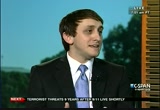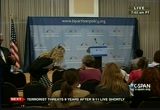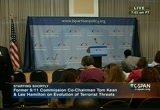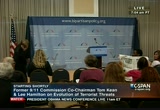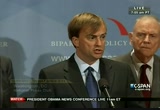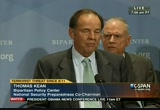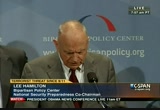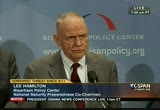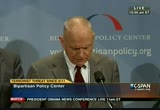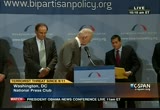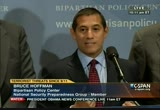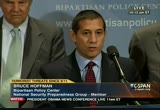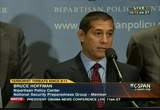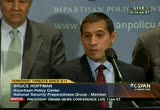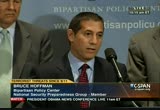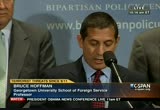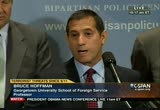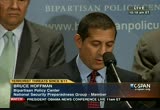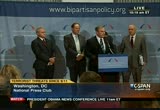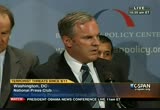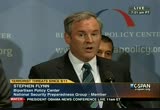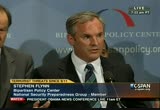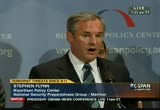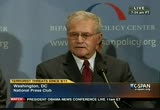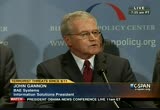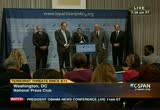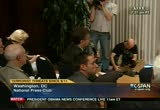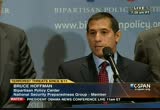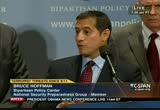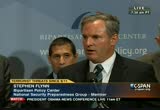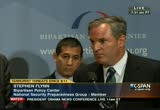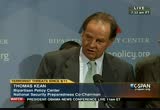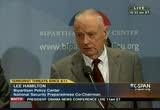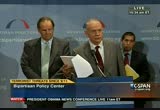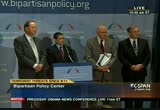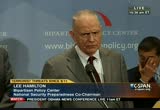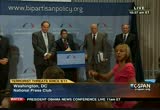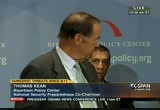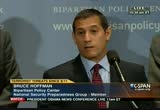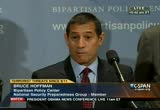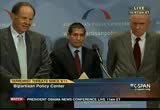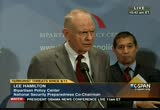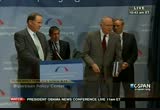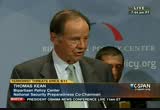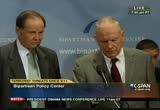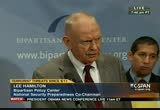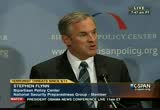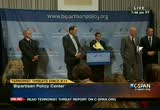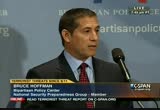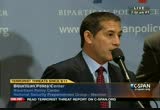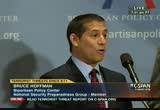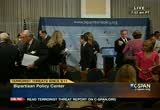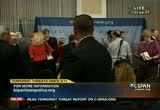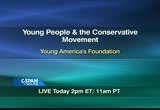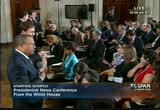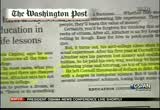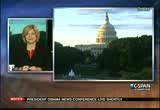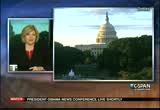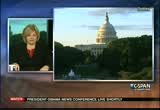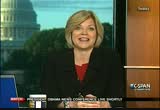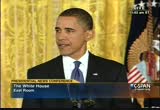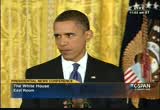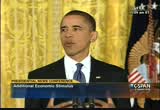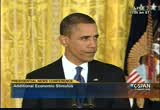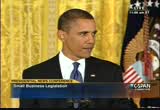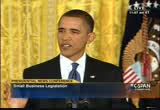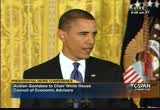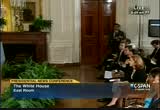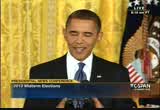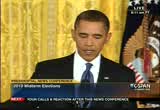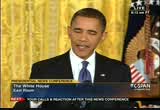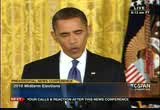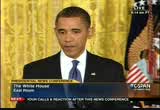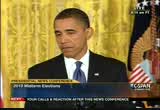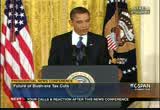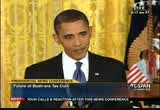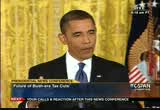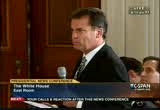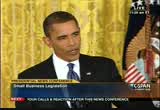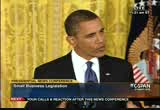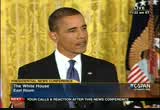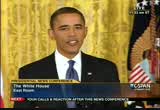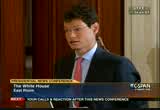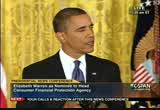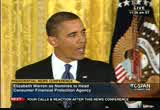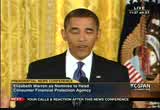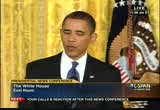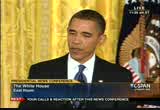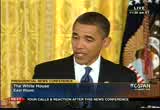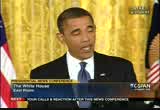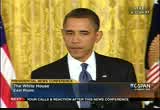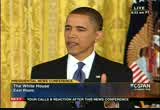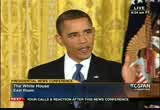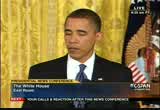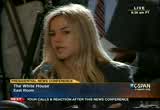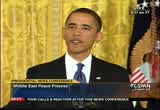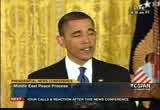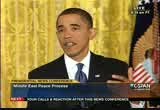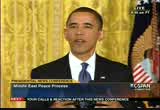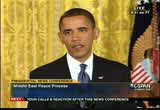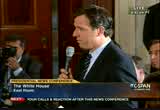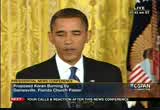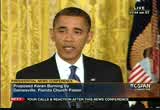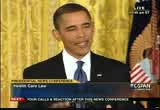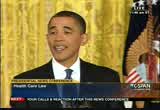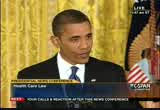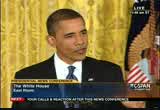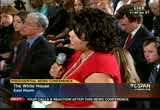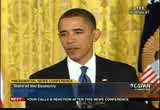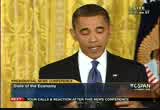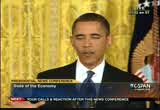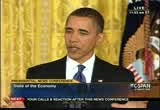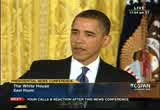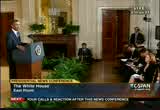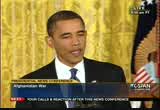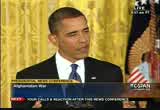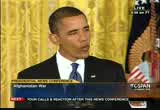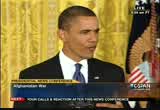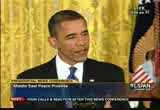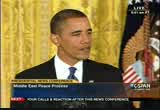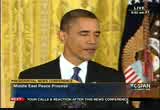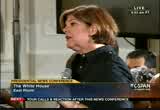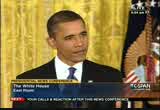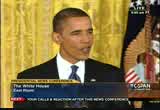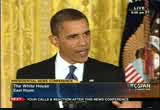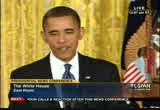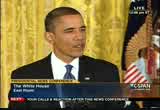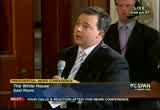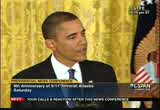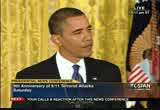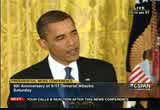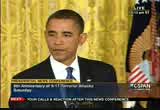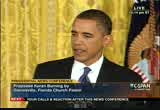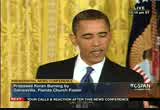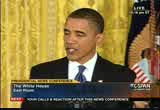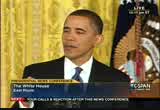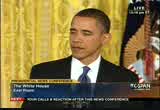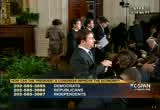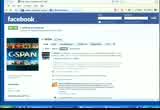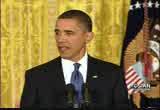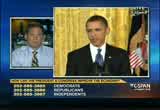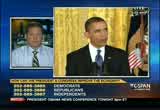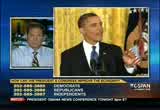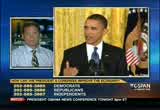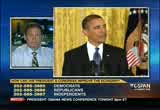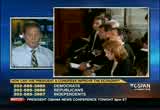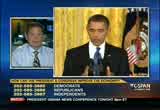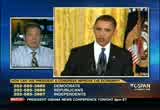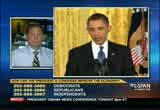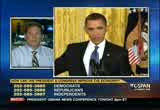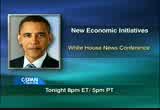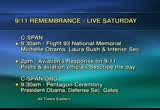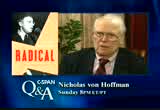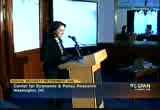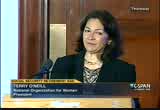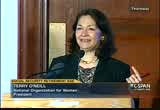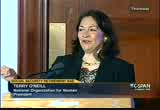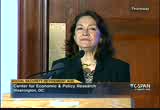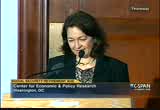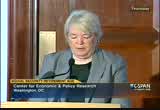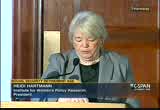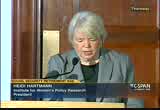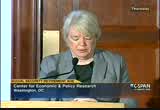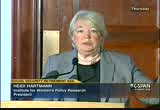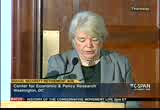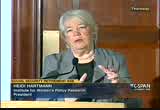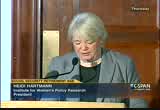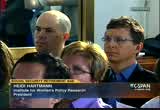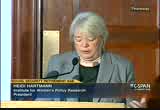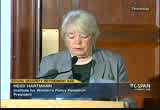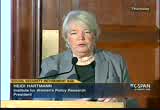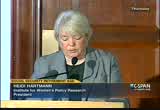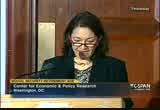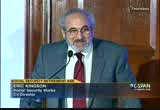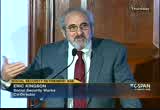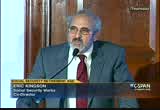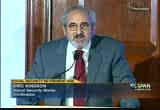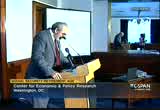tv U.S. House of Representatives CSPAN September 10, 2010 10:00am-1:00pm EDT
10:00 am
fromcu. good morning. caller: along with our suffering economy, the war in iraq is a huge point of contention with american voters. how do you think democrats will address concerns about our and occupation in the middle east if the war continues for much longer? guest: to is important to note that our combat mission has ended in iraq and that was a campaign pledge made by president obama back in 2007. that is really important. it etzel lot of credibility to the president when it comes to foreign policy. it is the kind of thing that should have progressives feeling more comfortable so they are understandably nervous about afghanistan but comfortable with the idea that this president is not interested in an endless war and he has credibility behind him that he will take action to
10:01 am
do what he has promised to do. he will make those changes as needed. host: i will squeeze in john from minnesota, a quick question korean caller: thank you for taking my call. during the 1950's, these big corporations and ronald reagan took a office -- guest: our tax rates today are lower than they were when ronald reagan was in office. that is not something the tea party would like to a meto admi. millennial are one of the generations that is most often asked about tax issues. they say they are comfortable with the tax rates. they see government as playing an important role and they understand that taxes are an important aspect of the government being able to play
10:02 am
that role. host: the book is called "permanently blue." it is available widely at bookstores. thank you for being with us on this friday. let's tell you what we're doing next. we will take you to the bipartisan policy center here in washington, d.c. and the panel session that looks at what we have learned nine years after the 9/11 attacks. there is an evolving terrorist threat and there will be several speakers. live coverage begins shortly. thank you for being with us on this friday morning and we will see to morning -- tomorrow morning at 7:00 a.m. on "washington journal." [captioning performed by national captioning institute] [captions copyright national cable satellite corp. 2010] .
10:03 am
10:04 am
>> we are leave at this national press club this morning where former 9/11 commission lee hamilton and tom cane will speak with reporters about how terrorist threats have changed since 9/11. the two are now co-chairs of the national security preparedness group of the bipartisan policy center. it's an organization founded three years ago by former senate majority leader tom daschle. bob dole, george mitchell, and howard baker. this is live coverage on c-span.
10:05 am
welcome, everybody, i'm michael allen of the bipartisan policy center. i'm project director of congressman hampton and governor kane's national security preparedness group whose mission is to oversee the commission of the 9/11 commission recommendations and to study other national security issues. we are housed at the bipartisan policy center founded by former senate majority leaders mitchell, daschle, dole, and baker to promote bipartisan solutions to the nation's problems. i'd like to introduce governor kane to introduce the report and the panelists. thank you. >> thank you, michael. good morning. we are here again preparing for another anniversary of 9/11. preparing to mourn with the families, to look at what happened in the past, to remember, but also to look forward. part of that looking forward is to reassess what the threat is
10:06 am
today. how are we doing? are we doing any better than we were before? and has the threat changed in any way? that's what we want to talk about today. this is a very important time to reassess, to reexamine -- re-examine, to look at what this threat is on the group that we formed, sort of the successor to the netch commission, we have met now with all the leaders of national security in this administration, we have heard from people who have led the national security efforts in the past. we are trying to formulate what the country should do, what we should be aware of, and where we should go. and in that context this is a very important day. this report we'll present here today is looking forward, is looking how the threat has changed, and the kind of things we may have to do and the ways which we have to change as a nation to meet that threat.
10:07 am
at this point i'd like to introduce my partner, my friend, one of the washington's other national monuments, lee hampton, who has been so instrumental in national security and so many other ways in this town. lee, if you'll take it from here. >> good morning to all of you. thank you very much for coming. good to be with governor kean again. as we have conduct add good many of these over a period of several years. i step forward simply because i want to recognize the members of the national security preparedness group. we will turn to bruce hoffman in just a moment. he and peterbergin are the two -- peter bergin are the two key players, they are the ones who put together this report and i know you want to hear from bruce. i think bruce intends to summarize the report briefly.
10:08 am
and then he, john, and steve will take your questions, and tom and i will chip in if we can. we have assembled, i think, a remarkable group of people with regard to their backgrounds in national security and homeland security. they are a real group of experts. john gannon is one of the members. he's here today. he's had a very long and distinguished career in the intelligence community. now works at b.a.e. systems as one of their trusted advisors. our group includes fran townsend who worked in the white house on homeland security matters. it includes the former secretary of d.h.s., governor of pennsylvania, tom ridge. also includes former energy secretary spencer abraham.
10:09 am
we have two former attorney generals in the group, dick ther nwerg and ed meese, and we have several former members of congress. jim turner, and dan glickman, and dave mcgurdy. you put all these people together you have a good group to assess where our government stands with regard to national security preparedness. we believe that this assessment that is being released today, and bruce will describe to you in just a few minutes, is a very important document. i don't think i have seen anything quite like it. haven't seen all the things that come out of government, but i have seen a good many of them. and you will see that it gives a very fresh perspective on the threat that we confront from al qaeda. so our focus today is on this
10:10 am
paper and the evolving threat from al qaeda. in the future, we will explore other aspects of homeland security and national security preparedness. but today the focus will be on the report. so, bruce, to get us into this report we ask you to step forward and give us a summary. >> thank you, lee. before i begin let me first thank very warmly and appreciatively the bipartisan center and especially the executive director of this effort, michael allen, whose support throughout this entire project was absolutely critical and essential and also i'd like to thank the other members of the group, chair, co-chaired extremely ablely by governor
10:11 am
kean and congressman hampton. unfortunately, my co-author, peter bergin isn't here. this report clearly been fitted from peter who is perhaps not only the word -- world's leading expert on al qaeda and has written two books on osama bin laden. also a magnificent editor who himself greatly improved this product. i have to say, too, any of you familiar with either peter or my work can very easily disentangle the d.n.a. in it of each of us. we came at it from two different perspectives but complemented one another and supplemented by the expertise from the group and produced something that is rather important. it also wouldn't have been possible without the assistance of katherine teeterman of the new america foundation who actually took what peter and i had written, melded it together, and during iterations as we took input from other members of the group, came out with this document you have before you. now, rather than go through some
10:12 am
-- the 42-page document, take some time to summarize, let me instead zero in previously on what i think is the key to the most important conclusions or findings. i'd also put in some context the work that we did. first we started from the assumption that it's been six, often six long years since the 9/11 commission released their report. we thought it was appropriate to do a complete threat assessment, new net assessment of the threat. also i think significantly it's been three long years as well since the last publicly disseminated u.s. government threat assessment. this was the national intelligence estimate produced by the national intelligence council in july, 2007. so the group thought it was enormously important before we began the rest of our work of making recommendations to establish a foundation or base line, assessment of the threat as it exists today but even more
10:13 am
importantly how it's evolved and changed in the times since both the 9/11 commission's report and the national intelligence assessment from three years ago. we have very fortunately wide access to an array of senior policymakers across the united states government who are open and frank with us and generously offered us their thoughts and their opinions. this of course was supplemented in turn by the ongoing research that peter and i separately have been conducting on this phenomena. fundamental conclusions, is that the threat is both diversified and become much more complex than it has been at any time since the attacks on september 11, 2001. equally i think of concern is the fact that no single profile of the terrorist threatening the united states today. what we see as an adversary is in essence drawn from all sectors of society and walks of
10:14 am
life. these include persons born in afghanistan, egypt, pakistan, and somalia, residents in the united states, many cases naturalized american citizens, but also in the past few years what we have seen increasingly is american citizens themselves, people born in the united states, also gravitating, also being summoned to the clarion call of terrorism and in this case jihad. we discovered that the perpetrators or the people plotting either to commit terrorist acts in this country or travel overseas to receive training and terrorist -- were both young and old, male and female, married and unmarried, well educated, some of them had m.b.a.'s, masters of business administration. others were high school dropouts or jailbirds or ex-cons. we captured people that self-dezribed as petite blue-eyed blondes. that's how jihad jane described
10:15 am
herself. as well as hardened terrorist operative such as the chicago and david headly whose reconnaissance was instrumental in the success of the november, 2008 mumbai attacks, staged by a close ally of al qaeda. and was continuing to carry out reconnaissance using the united states as a base for future terrorist attacks both on behalf of al qaeda, other pakistani jihaddy groups, as well as lash gar. we also found that the leadership of these terrorist profments that threaten the united states is becoming increasingly americanized. what do i mean by that? key operatives, whether it's someone like shukamunja, whether it was someone like omar halmani a somali allied of -- ally of al
10:16 am
qaeda, all three born in the united states, turning on their country, going abroad, making common cause with terrorist groups. that's something we found fundamentally disquieting. finally, we concluded the attacks and plots of the past year or so are not and should not be regarded as one offs as we are often told. rather we see them as part of a broader strategic -- strategy, embraced our our adversaries by al qaeda and associates, to flood us, in essence, with multiple threats from a diverse array of adversaries. we found, too, the united states has failed to adequately understand and prepare for these threats. there was a prevailing conviction that existed long past its shelf life that couldn't happen here. that the commupets in the united states from which -- communities in the united states from which terrorists we thought would draw
10:17 am
their troops we regarded as more affluent, better educated and more diverse than similar communities elsewhere, and that therefore the american melting pot would provide something of a firewall to prevent radicalization and recruitment in this country. yet this hasn't proved to be the case and now we are confronted with an alarming trend. the threat we concluded is more complex, more diverse than what we have encountered at any time since september 11, 2001. an important challenge that we discovered is that there is no single government agency responsible for identifying radicalization and interdicting recruitment. the problem is if it's everyone's responsibility in the end it's no one's. moreover, we found it's not even clear which agency amongst the vast array of agencies in intelligence and law enforcement community in the united states, which agency should have the
10:18 am
lead responsibility for countering radicalization and recruitment. thus terrorists may have found our acallies heel. we have no strategy to deal with this growing problem and emerge yedge threat. the diversity of this array of terrorist recruits thus presents new and greater challenges to the intelligence community and law enforcement agencies across the country who are already overstressed and inundated with information and leads and now have to run down this new panoply of threats coming from multiple dimensions and variety of actors and organizations. in sum, let me conclude here, we found that the threat facing the united states is different than it was nine years ago. it has also changed and evolved profoundly since the 9/11 commission presented its report six long years ago. today america faces a dynamic threat that is diversified to a broad potential array of attacks. from shootings, to car bombs, to
10:19 am
simultaneous suicide attacks, to attempted in-flight bombings of passenger aircraft and this is a state of affairs as we approach the ninth anniversary of the september 11 attacks is cause for concern. thank you very much. >> thank you. i'm steve flynn, the president of the center for national policy and delighted to have been able to be a part of this very distinguished panel and work with bruce and peter who i think provided such a superb report. just a couple things i would like to highlight, particularly from a homeland security perspective, about what i think we should infer from their key finding. they have given us a very uncomfortable finding. i think it's uncomfortable for the american people, but also for our national security and intelligence community as well. that al qaeda and its affiliates and increasingly others who are drawn to this cause have
10:20 am
essentially made a significant strategic shift away from the spectacular attacks like we saw on september 11 and consensus that many of us had in the immediate aftermath of 9/11, which is to equal or better that attack, to one where basically less is more. less sophisticated attack conducted more frequently can have as big of a bang for less buck than a real spectacular attack. what that means in very straightforward terms is that the bar for carrying out these attacks is much lower. you don't need as highly capable people. you don't need to put together a very sophisticated conspiracy. the more sophisticated attacks have an upside, that their complexity often trips wires off that allows us to intercept them. much slaller-scale attacks, particularly drawn from domestic recruits, are almost impossible for our national security intelligence community as is
10:21 am
currently constructed to detect and intercept. as a practical matter it means we will almost certainly have successful terrorist attacks on u.s. soil and we need to start coming to grips with that. and the important finding here, is there not likely to be a 9/11 scale? we are going to see the kinds of things that we saw most recently in new york in time's square, an american nationalized citizen who drawn to the cause gets training overseas and comes back, leaves bridgeport, connecticut, and drives into new york city. one of the most important things about the time's square event was that time's square is arguably the most visibly, least place in the united states with perhaps the exception of the white house. the detection of shazad's scheme was done by a t-shirt vendor on the corner. literally one of the folks we did speak with in this panel was
10:22 am
with commissioner kelly of the nypd. literally across the street on broadway and 42nd was a squad car. that wasn't the detection point. it was an everyday citizen who detected the problem. fundamentally our national security apparatus and our intelligence community have been operating on we will focus all our energy and efforts on dealing with an adversary away from our shores, so essentially we americans can go about our daily lives confident this threat is not going to be on our shores. i think a central finding of this report is that that's not how the threat is today. it's evolved much more with the domestic component. it still has the oversea pieces, but it also speaks very much that our national security apparatus are not as adapting as much as they need to for this threat. minimumly we are talking engagements of potentially up to 50,000 public safety agencies who are going to be the frontlines of this kind of threat. but more importantly perhaps is
10:23 am
the everyday citizens. the christmas day bomber attack was not stopped by a federal air marshal. it was stopped by the passengers aboard that plane. the time's square incident, again, was not stopped by our national security or local law enforcement, it was detected by a t-shirt vendor who alerted local law enforcement. that was very essential for going after him afterwards. the bottom line here is, the threat is much different today than it was nine years ago. our national security and intelligence communities to adapt to that, but we the american people must as well. i want to commend the work of bruce and peter and the opportunity that i have had to be a part of this panel to bring this very important finding, i think, to the american people. and hope that we take some action soon. thank you. >> thank you. i want to join in the applause for this paper and compliment peter and bruce on what i think is a very thoughtful,
10:24 am
insightful, and provocative piece of work that i hope will stimulate a larger public debate on the important issues that it raises. as someone who spent most of my adult life in the intelligence community and analytical world, i'm focused on the issue of radicalization and just point out that in my experience radicalization is really a function of globalization. we all know that our adversaries have a much easier time in the era of globalization in moving people and moving finance and moving capabilities and destructive know how across borders. i think this paper makes it clear that they also move cultural information across borders. cultural information not just from the places we expect it in the middle east and south asia, but western societies and our own. i think the imperative that comes from this is to recognize that we need to have analysis that integrates foreign and
10:25 am
domestic intelligence and analysis more than at any time in our history. this is an absolute comparative for us if we are going to deal with the issue of radicalization. i think the paper also makes clear that intelligence analysis is not just a matter of taking human intelligence and imagery analysis and pulling together, but it's much more important today if we are to understand the nature of terrorism to put cultural information and put cultural information in that context into the analysis we do. that means understanding the cultures from which the terrorists come, but also our own culture and how it is being coming susceptible to radicalization. we are going to have -- i'm delighted to tell you on the 6th of october the nspg will sponsor a conference on domestic intelligence on the willard hotel, and the new d.n.i. will be there along with the f.b.i.
10:26 am
director and other leads in the intelligence community. we are going to follow on some of the discussion that this paper raised. i look forward to that and i hope i have a number of you join us for that conference. thank you. >> at this point we would be glad to answer any and all of your questions. >> cnn, you mentioned there is no one organization responsible for looking at the domestic threat and handling it. some might think that would have been the roll of -- role of d.h.s. where does the responsibility lie? what would you recommend in terms of how this should be conducted? >> that is a subject for the next report. we thought this report stood on its own. actually this report turned out to be far more weighty than we imagined it would be and decided that the group really needs to
10:27 am
focus its attention for the next few months on precisely those recommendations having identified the problems. it's not something we deliberately at this juncture consider. >> tom frank from "usa today." i'd like to ask two questions about commercial aviation. the report is commercial aviation is the number one threat. question one, why is that still the case? especially given that the attacks on mass transit in madrid, london, moscow. secondly, how effective has the efforts been both since 9/11 and more recently with advanced imaging technology to stop the kind of threats that you write about? >> the problem i think is that our adversaries, despite all the advances we have made, all the technological fix -- sophisticateation, the reorganization of our government
10:28 am
to address the threat to aviation, they see this as fundamentally a high value target. a target that they believe not only can generate a load of publicity and attention, but also one that stokes worldwide fear that radiates beyond just the target of the attack or target nation of the attack that has a profound impact on globalized economy. on international travel. one of the things we talk about in the report is that al qaeda in particular, but also we see many of its allies and affiliates, focus on economic targets. because they believe that's fundamentally how they win. they don't claim they are going to defeat us in the battlefield. they understand the fundamental simtry of terrorism they can't hope to defeat the united states militarily. instead they seek to bankrupt us and our allies. they see one of the key vehicles to doing so is targeting commercial aviation because of the throttle travel, throttle
10:29 am
aviation. aviation is commerce as well as cause the paralysis that we say, hope will cause the paralysis we saw in the weeks after 9/11. your question goes right to the heart of the report in fact. this is i think the main challenge that we face in countering this threat. the threat doesn't come from one adversary in one place with one set or one toolbox of capabilities. rather what we see is a variety of adversaries with kitchen capabilities that each pose off unique and separate threats. we have to in effect, unfortunately, as we go into the second decade of the 21st century, we have to cover the waterfront. we have to be as flexible and adaptive in responding to threats precisely as you said, on metros on subways on buses. we have seen it being vulnerable in other countries. as well as to an adversary that still persists in going back to the same target set because of the value they see in having catastrophic impact from that type of attack.
10:30 am
>> i think the key here is that the data tells us that commercial aviation continues to be a target and continues to be planning there. but again reinforcing what bruce just said, nine years later the adversary has, and the strategy has adamented significantly. these other areas, other transportation modes, other parts of the critical infrastructure remains very much in the crosshairs of not just the current generation of terrorists but future ones. the expectation is by targeting these they can get a big bang for the buck. a lot comes from how we react in the aftermath. if we have an attack on something like our mass transit system and our current efforts are shown as wanting, then we get a political reaction off with very expensive kinds of, not often very well-thought-out cures that continue to motivate. i think that's another finding in here is that to some extent the strategy has adapted because they are motivated by how we
10:31 am
react to acts of terrorism. and so if we -- basically do very expensive things, or very destructive things to our economy or civil liberties. that's a motivator. another key thing i think we are going to look at as a panel is how do you think that we cannot prevent every act of terror as they go to this less is more, how do we do better as a country managing terrorist attacks when they happen, if they take on these various other modes of transportation. >> if it's just security theater or is this helping? >> we did not, as panel, look at that. there is no question that the impulse after the underwear bomber was to put things out there that would reassure the flying public. i think there's more studies that needs to be done whether those tools will work or more of
10:32 am
-- morph into another direction. no, this was not entirely well-thought-out when it was executed. that's part of the problem. we often react in ways that need more -- there are clearly damages to those tools and they have limitations. >> i might say one more thing. the technology is going to continue to change on both sides. they found a new kind of plastic that was undetectible as an explosive. they used it to try to assassinate the head of the intelligence for the saudi arabia government, the prince. he told us all about it. we didn't react. the next thing was the so-called underpants bomber who tried to bring down a plane. so we are going to keep on jumping on the technology side. they'll try to come up with new things. we'll try to counter them. in the meantime our best defense is going to be the flying public. who spots things on an airplane. brings things to people's attention. and we have to keep people
10:33 am
absolutely -- in the end they are probably our best defense. >> i'm not sure we have said yet, but just want to make sure the word dangerous has not been used here yet. we have said that this attack, these attacks are more diverse, but i'm not sure we have used the word dangerous. we consider the threat still serious and dangerous. i think that's important that the american people not get complacent. one of the interesting paragraphs or two in the report for me was on page 4 where we state that this year, this past year, was a watershed in terrorist attacks and plots in the united states. 10 jihad attacks, jihad-inspired
10:34 am
plots or efforts by americans to travel overseas to obtain terrorist training. two actual attacks. three, serious but disrupted plots. five incidents involving groups of americans conspiring to travel abroad to receive training. by our count in 2009 43 american citizens or residents were charged with terrorism. now, that really brought me up when i read that paragraph. the idea to the extent that the american people have it, that this is fading into the past, that's just flat wrong. take a look at page 4.
10:35 am
>> making sure that you don't create the kind of fear that undermines resiliency and breeds the sort of reaction that might fuel terrorist propaganda is a very delicate one. i'm wondering if you had an opportunity to assess the scale of the threat. bruce talked about the adversaries wishing to flood the united states with a series of smaller attacks. but in terms of the actual scale, in terms of numbers, are you suggesting that american people should be afraid now? should be nervous that their neighbors, there are thousands and thousands of sleeper cells or terrorists in this country and they should be worried about their neighbors or have you had an opportunity to assess the scale of the threat inside the united states?
10:36 am
>> i think your question is very, very good and sets out the dilemma you confront. you don't want to square people and you don't want to throw them into a panic. we don't mean to do that by this report. it's my perception, could be wrong about this, that the american people have kind of lost their focus on the threat. i think one of the values of this report is that it brings the threat more into perspective, still serious, and still dangerous. the american people just have to get a more realistic sense of what they are confronted with. i think steve said a moment ago, did you not, steve, that you anticipate, i think most of us do, that one of these attacks someday will succeed. and the american people have to be prepared for that and resilient to it.
10:37 am
so the balance that you strike in your question is very hard to hit. hard for the american leaders to hit it right. we are trying to do the best we can to say, don't forget about this. don't be complacent, don't panic. but there are a lot of things we still need to do to make our country safer. >> voice america tv, sorry. with regards to that homegrown terrorism, can anyone speak toward why it is occurring, why we are seeing an increase, that what you mentioned on page 4 in the report? >> why is it increasing? bruce, you can take it. i say the internet. the idea, the ability the world is flat. things happening all over the world. these people can recruit on the
10:38 am
internet. some very charismatic and they seem to be able to speak particularly to young and impressionible people who happen to be muslims. that's certainly one factor. second, i think the change of strategy. the report points out al qaeda is trying to do this because they have been unsuccessful in doing the big threat which they like to. they are deciding they can disrupt us this way. it's a change in strategy. i'm sure there are other reasons. >> one of the things stated in the report is important, we have been talking about change and the way this has evolved. that's all correct. one thing's not changed. intent. we know the intent of those who wish to do us harm. what may have changed, we think has changed, is the capability of them to attack us. but they are still after us. they still want to do us harm. and they still want to get us any way they can, in our view.
10:39 am
intent is the driving force here behind the terrorist ack fifth. -- activity. and it remains the same. >> i think governor kean and congressman hampton are right. the internet has played a big part. what we have seen is terrorist organizations becoming much more comfortable in their communications, in many cases someone like alakhi, who is born in the united states who can communicate with people not in overly theoretical manner but has the theological credentials but grew up in new mexico. understands american sign. understands charismatic. reaches out to people. that's one reason. another important reason is what also the report talks about, and i haven't addressed in my overview, is the threat is radiated outwards from al qaeda central itself. it used to be if you wanted to be a terrorist or training,
10:40 am
there was in essence one central point that you went to, generally afghanistan and more recently pakistan. the remaining al qaeda command is located. one of the problems i think is part of al qaeda's strategy to enlist, to encourage, to motivate like-minded jihaddy groups similarly rise up and also spread their wings, go beyond the previous local or very parochial agendas they once had, or contemplate operations in europe or the united states, has meant that individuals looking to receive terrorist training unfortunately today have more destinations they can select to go to. we have incidents in the past month of individuals attempting to go to somalia rather than pakistan. there have been, unfortunately, several incidents now, not just the christmas day plot that emanated from yemen, but also muhammad, the former carlos bledsoe, in june of 2008 murdered one u.s. recruiter and
10:41 am
seriously another one in little rock, arkansas. he left the united states, gone to yemen, and returned to this country and engaged in violence. that's one of the problems is the threat is diverse filing not only in terms of profile of adversaries in the united states itself, but also in terms of the number of groups in addition to al qaeda who are independent but in many cases have made common cause with al qaeda who also threaten us. >> i'm surprised in all this discussion about why and motivation the issue of u.s. policy doesn't come up. isn't it a motivating factor for new recruits our policies in afghanistan and iraq unconditional support for israel, the use of droughns that killed so many civilians, the bases the u.s. has all over the world, as one of the reasons for the original attack, now i would say the rise of islamphobia in the united states. can you talk about these motivations and what we can do
10:42 am
policywise to stop the threat? >> we made a very conscious decision on this report. originally i think we thought we would present you the report very much as you have seen it, and then add to it a number of policy recommendations. we rejected that because we thought the important thing was to focus on the assessment of the threat. as stated in the report. and we wanted more time, frankly, to formulate policy recommendations. but your question clearly kind of predicts in effect what we have to do now. we've got the assessment of the threat and now we have to figure out what kind of policy recommendations. there are sentences, there are
10:43 am
paragraphs in the report which suggest some of our future recommendations, for example, you can clearly see by reading our report that we are going to put a lot more emphasis on state and local police for thers. -- forces. we didn't articulate that, but i'm sure we will in the future. we backed away from policy here. we are not quite ready to address that. >> one of the question recommendations in the 9/11 commission report is that the united states needs to engage and win the struggle of ideas. that has almost come to a complete stand -- stand still at this point. there are serious controversies and debate here in this country taking place over both the ground zero islamic center and the situation in florida. i'm just wondering how you see that and your perspectives and recommendations that you made over five years ago at this time
10:44 am
and what more can be done? >> chapter 12, lee says. you're right. we are looking at all recommendations. we know that most of them have been implemented, at least in part. some of them have implemented in greater than part. some of them we want to see more action on. we established a director of national intelligence. we'd like to see that position strengthened, given the full support of the president. communications, we are not there yet. the recommends involving congressional oversight is not implemented at all. that's a glaring, glaring failure. and the recommendations involving foreign policy and ideas, we are not there yet. doesn't mean we don't continue to work on it. it doesn't mean huge blowing up
10:45 am
issues of actions among american citizens based on ideas, particularly ideas that are interpreted by many to be anti-muslim, are not helpful. and are in fact harmful. these kind of issues and these kind of debates do not help when we are trying to prevent people from being recruited. they do not help, i don't think, in the war on ideas. >> i agree with tom. i simply say that i think the american relationship with the islamic world is one of the really great foreign policy challenges of the next decades. we are not going to solve it in a year or two or five or even 10 years. the kind of debates we are having today in new york city and florida and other places reflect that. how do we get right, how do we line up this relationship better than we have been able to do. i don't know whether we'll get
10:46 am
into that. i jokingly said in response to your question look at one of the chapters in the now ancient 9/11 commission report, but it addresses this whole question of how you should approach the islamic world. incidentally that chapter has had considerable impact in the foreign policy community in the sense that it has stimulated an enormous amount of work and thought about how to go at it. i must say i don't think it's been implemented very effectively at this point. but i am encouraged by the fact that we are beginning to address this key relationship. 1.3 billion or 1.4 billion muslims from london to jakarta, an enormously important force in the world, and we have to
10:47 am
understand it much, much better than we do. and how to address it. >> if i might add that i think one of the clear implications of the finding that we are more likely to have increasingly domestic related terrorism attacks and these are extremely difficult to prevent so almost certainly have one be successful. there's a lot of domestic policy issues that need to be really threshed out that we largely postponed in the aftermath of 9/11 because we treated it primarily as a foreign polcy, national security beyond a set of challenges. so i guess i can try to draw any silver lining out of the current very heated debate. it is that we are engaging civil society around these hard questions. the real key is for political leadership to not exploit this in near terms but really use it as an opportunity to get the american people engaged around the challenge, but fundamentally how we safeguard our core liberties and values in the
10:48 am
context of this threat going forward. there should not be a tradeoff. you want more security, you give up more liberty. the resilience is about being able to safeguard those liberties in the context of a threat. we as a society have to engage around how we do that. that's a set of policy challenges that will be different from those that the commission six years ago looked at. >> one more question. >> fox news, mr. hoffman, you said before that the melting pot theory no longer works. why has that changed? and also you mentioned that there's no single profile for potential terrorist. but aren't they all muslim radicals? >> well, i think first of all the melting pot, i think was more wishful thinking that somehow we could be insulated from the heady currents of radicalization, the clarion calls to bat that will we have seen affect communities in other
10:49 am
parts of the world, particularly in the united kingdom, spain, belgium, germany, and so on. in the end we found out we aren't different. that also comes back to the question about policies. some cases you have countries that either did not participate in the invasion of iraq, that may not have forces in afghanistan, that have removed their forces from both countries and still are under threat. still face attack. i'm not sure it necessarily boils down to foreign policy. i think it's more complex than that. don't forget, 19989 united states did not -- 1998 the united states did not have troops in iraq or afghanistan. we had the greatest advances we ever had in the palestinian peace process. i don't think they have any shortage of issues to gravitate towards or to sort of bang the drum to summon people. yet one respect to the other we are talking about people, from one particular demographic group
10:50 am
that for a variety of reasons, again, have somehow been infected, infused, have been responsive to in some cases theological justifications, in some cases just conceit of young men pumped up with testosterone. other cases feeling it's their duty to defend their breath reg, religious kith and kin. i think the people from a variety of walks of life have been more susceptible to these calls in part because of the war on terrorism is now lasted nine years longer than world war ii, for example. and therefore they have found more fertile ground for recruitment. their messages and means of recruiting people, using a diverse array of lures, have also become much more effective, unfortunately. what we are saying in the report is the united states in essence is caught up with europe. this is a problem that especially since the july 7, 2005, suicide attacks on the
10:51 am
london underground britain has grappled with. britain before those attacks also thought they could remain immune to this. they thought the problem existed on the coin tent nent where communities were less integrated. they were surprised on july 7 of 2005. this goes back to sues zahn's question. our point isn't to sound an alarm. we are still talking about small numbers. 10 or 11 plots. 43 persons i think is disturbingly large only because it was zero a few years ago. the united states department of justice indicted more than two dozen persons on terrorist charges last year. that's our point. if we fail to take action, we don't recognize this is an emerging problem and growing threat, that then in a few years it will be cause for alarm. right now is the time to look at the threat as it is unfolding to understand it's one that's exceptionally dynamic. and to accept that what worked yesterday and what we did yesterday or even today against this threat is no longer sufficient. we have to be just as dynamic.
10:52 am
10:53 am
10:54 am
prom will be talking with reporters this morning and answering questions. earlier this week the president proposed new tax breaks for business and infrastructure stimulus projects. we'll have live coverage from the east room of the white house starts in just a couple minutes. at 11:00 eastern. here on c-span. coming up at 2:00 eastern we'll be live at the look at the modern conservative movement. tomorrow marks the 50th anniversary of a statement by a group of young conservatives of the home of william f. buckley. today a look at the impact of that document. tomorrow is the ninth anniversary of the 9/11 terrorist attacks and we will have live coverage as the new memorial in shanksville, pennsylvania, is unveiled at 9:30 a.m. eastern with michelle obama and laura bush. president obama will be at the benning benning's memorial ceremony. live coverage of that -- pentagon's memorial ceremony. and at 2:00 eastern we'll be with the pilots as they remember
10:55 am
9/11. this weekend on c-span 2's book tv, lawrence right pulitzer prize winner for "the looming power" on the events that led up to 9/11. on afterwards, posteditor in chief editor in chief arianna huffington. she's interviewed by cnbc's maria. go to book tv.org. >> the bottom line is we need our borders secured and we can't afford all the illegal immigration. >> it's hurt us. it's hurt arizona's economy seriously. we see the stories everyday. >> with the midterm elections about 50 days away, follow campaign 2010 online at the c-span video library with debates from key races across
10:56 am
the country. it's easy to follow the candidates and issues any time, all free on your computer. prom will be holding a news conference on the economy in the east room of the white house. this is a live picture from that location. this will be his first news conference since may. and we'll have live coverage followed by your phone calls again, starts at the top of the hour at 11:00 eastern. until then your phone calls from this morning's "washington journal." us more details. the we are also using "the washington story -- "the washington post" style section. this is their front page. it leads this way --
10:57 am
she quotes a hedge fund manager who says -- he's not planning to send his two daughters to college. this contrasts with his own experience after his first year at cornell university. his parents lost money and couldn't afford tuition so he paid his own way, working up to 60 hours a week delivering pizza and tutoring on top of his course load. he left cornell thousands of dollars in debt and a degree in computer science and successful today. the question is, in this economy today and the change in how our economy is built, is college overrated? let's get to some phone calls. beginning with williamington, delaware. jean on the independent line. caller: good morning.
10:58 am
i was talking about this with my family over the weekend and got my parents wild. i graduated in the early 1980's and i don't think i ever recouped. i am neat working in my field now. all of my fields, the evenly one working in her field. i field made a living out of it is working for the government. the rest have tried self-employment. the experience was good, but i don't think that even today not what i'm seeing is ideal. they learn one topic, they focus on that. they are out there partying nine times out of 10. it just seems -- it seems like futility to me because i'm barely making ends meet. i have a challenge ledge -- college degree. everybody said that was my particular tote success. people are going back for m.b.a.'s, barely keeping their jobs. losing jobs. well educated people.
10:59 am
host: what was your degree earned? >> b.s. in music. i tried teaching. i tried working for various organizations and churches over the years. it's just -- i love the field, but no one wants to pay you. i see that with friends or civil engineers. friends who are teachers. could never find a good enough paying job that they could raise a family. two people are now working and they are telling themselves to make ends meet. they are all going through this thing, too. should we really send our kids and spend this $40,000, $50,000 a year sometimes for -- host: thank you very much. rancho, california. republican line. good morning. caller: ratcho san diego. i think this person was crazy who said that college is a waste of time. i don't know -- where would you be without a degree in this job market? i was -- i joined the navy when i was young. i got my degree at nights when i
11:00 am
was stationed overseas. i went all the way got a master's degree. best thing i ever did. these people who get -- i'm not -- whatever you want, if you can get a degree in music and you know what you can use it for, >> all i know is i would bet consulting firms and if you do not have a degree, you are not going to be looked at. this person is crazy who says that college is a waste of time. it is the only thing you can do. i do not what else to say, put the kid in the military and hope he has a good job skill when he gets out. but if you let him go out here and flip burgers, what are they going to do? host: thank you. calling in from rancho, san diego. there are statistics.
11:01 am
comparing the unemployment rate at large vs college graduates in 1970 and today. in 1970 when the overall unemployment rate was 4.9%, college graduates, it was negligible, 1.2%. this year, 2010, nationally it is 9.6% and unemployment rate for college graduates has risen to 4.9%. next is a call from lincoln park, new jersey, as we talk about the value of a college education in society today. denise, democrats line. caller: good morning. thank you for taking my call in thank you for c-span. i don't think college is overrated. i think we really needed. the problem as i see it is the economy is is shifting and in a state of flux. things are very expensive. and because -- the cost of tuition is extremely high, but there are ways to manage debt. >> you can listen to "washington
11:02 am
journal" here at 7:00 eastern. now live to the president. >> before i take your questions i just want to talk and look a bit about our continuing efforts to dig ourselves out of this recession and to grow our economy. as i said in cleveland on wednesday, i ran for president because i believe the policies of the previous decade have left our economy weaker and our middle-class struggling. policies that cut taxes, especially for millionaires and billionaires, cut regulations for corporations, special interests. and left everyone else pretty much fun it -- fending for themselves. policies that ultimately culminated in a financial crisis and a terrible recession that we are still digging out of today. we came into office with a different view about how our economy should work. instead of tax cuts for millionaires we believe in cutting taxes for middle-class
11:03 am
families and small business owners. we have done that. instead of letting corporations play by their own rules we believe in making sure that businesses treat workers well and consumers friendly and play by the same rules as everyone else. so, we put in place common-sense rules that accomplish that. instead of tax breaks that encourage corporations to create jobs overseas, we believe in tax breaks for companies that create jobs right here in the united states of america. we believe in investments that will make available -- america more competitive in the global economy, investment in education and clean energy and research and technology. these are the principles that guided us over the last 19 months. these are the principles that form the basis of the additional economic proposals that i
11:04 am
offered this week. because even though the economy is growing again and we have added more than 750,000 private- sector jobs this year, the whole that the recession left was huge. so progress has been painfully slow. millions of americans are still looking for work. millions of families are struggling to pay bills or the mortgage. and so, these proposals are meant to both the celebrate job growth in the short term and strengthen the economy in the long run. these proposals include a more generous permanent extension of the tax credit that goes to companies for all the research and innovation that they do here in america. and i propose that all american businesses should be allowed to write off all of the investments they do in 2011. this will help small businesses upgrade their plants and equipment and uncovered large corporations to get off of the side lines and start putting
11:05 am
their profits to work in our economy. we also announced a six-year plan to rebuild america's roads and railways and runways. already our investments in infrastructure are putting folks in the construction industry back to work. this plan would put thousands more back to work. and it would help us remain competitive with countries in europe and asia that of already invested heavily in projects like high-speed railways. but one thing we can do next week is and a month-long standoff on a small business jobs bill that has been held up in the senate by a partisan minority. i realize there are plenty of issues in washington where people of good faith simply disagree on principle. this should not and is not one of those issues. this is a bill that does two main things. it gives small business owners tax cuts and helps them get
11:06 am
loans. it will eliminate capital gains -- for key investments in 1 million small businesses. it will provide incentives to invest and create jobs for 4 million small businesses. it will more than double the amount small business owners can borrow to grow their companies. it is a bill that is paid for. a bill that will not add to the deficit. it has been written by democrats and republicans. it is a bill that has been praised by the chamber of commerce. and he had a minority of republican senators have been using legislative tactics to prevent the bill from even getting to a vote. i was pleased to see republican senator george of voyage of ohio said he would refuse to support the blockade any longer. senator voinovich said the country is really hurting and we did not have time anymore to play games. i cannot agree more. i understand there is an
11:07 am
election coming up but the american people did not send us here to think about our jobs. they sent us here to think about there'stheirs. there are small business is putting off plans to hire more workers because of this bill is stalled. it is not the kind of leadership this country deserves. i hope we can look forward to giving small business owners of the relief they need to start hiring and growing again. more on the subject of economics. i want to make an announcement about my economic team. this week christina romer returned to berkeley after an entire -- a tireless outstanding chairman of the council of economic advisers. she is brilliant. she is dedicated. and she was part of the team that helped save this country from a depression. we are going to miss her delete -- dearly. i am back to announce today austin goolsby her replacement,
11:08 am
when my good friend and closest economic advisers. one of the finest economic advisers and he has worked as a member of the council economic advisor since we arrived in washington. not just a brilliant economist but someone with a deep appreciation of how the economy at facts everyday people and he talks about it in a way that is easily understood. he works with the rest of the team very well. i have complete confidence he will do an outstanding job. finally, tomorrow we will commemorate not only to the heartbreak of september 11 but also the enduring values and resilience spirit of america. but michelle and i will join fellow citizens and remembering those who were lost on that day and honoring all that exhibited such extraordinary heroism in the midst of tragedy. i will have further remarks
11:09 am
tomorrow but for now let me just let you know that tomorrow is a national day of service and remembrance and i hope each of us find a way to serve our fellow citizens, not only to reaffirm our deepest values as americans but to rekindle that spirit of unity and common purpose that we felt in the days that followed that september morning. and now i would be happy to take some questions and i will start with darlene from abc. >> thank you, mr. president. you said this week that democrats would not do well in the november election if it turns out to be a referendum on the economy. but with millions of people out of work and millions of people losing their homes how could it not be a referendum of the economy and you're handling of it and why would you not welcome that? >> what i said was that if it was just a referendum of whether
11:10 am
we made the kind of progress that we need to, then people around the country would say we are not there yet. if the election is going to be about the policies that will move us forward versa the policies that will get us back into a mess then i think the democrats will do very well. here is why. as i just indicated, middle- class families have been struggling for a decade before i came into office. wages and incomes have flat line. seeing the cost of everything from health care to sending their kids to college going up. job growth was of the weakest of any economic expansion between 2001 until 2008 until world war ii. the pace has been slower than it has been of the last year. so these policies of cutting taxes for the wealthiest
11:11 am
americans, stripping away regulations that protect consumers, running up a record surplus to a record deficit, those policies finally culminated in the worst financial crisis we have had since the great depression. for 19 months what we have done is steadily work to avoid a depression, to take an economy that was contracting rapidly and start making it to grow again. a situation where we were losing 750,000 jobs a month, and now we have had eight consecutive months of private sector job growth. and made investments that are going to strengthen the economy over the long term. but we are not there yet. we lost 4 million jobs in the six months before i was sworn in. and we have lost 8 million jobs
11:12 am
total during the course of this recession. that is a huge hole to dig ourselves out of and people who have lost their jobs around the country and can't find one, moms who are sending out resumes and not getting called back. worried about losing homes and not being able to pay bills, they are not feeling good right now. and i understand that. and i ran specifically because i did not think middle-class families in this country were getting a fair shake and i ran because i felt that we had to have a different economic philosophy in order to grow. that middle-class can grow our economy over the long term. for all the progress we have made, we are not there yet and that means that people are frustrated. that means people are angry. and since i am the president and democrats have control of the house and senate, it is understandable that people are
11:13 am
saying what have you done. but between now and november what i am going to remind the american people love is that the policies that we have put in place have moved us in the right direction and the policies the republicans are offering right now are the exact policies that got us into this mess. it is not a situation where they went and reflected and said it to themselves, you know what, we did not do something to write. so we've got a whole bunch of new ideas that we want to present to you that we think are going to help put us on the path of strong growth. that is not what happened. the chairman of their committee has said we would do the exact same things we did before obama took office. we know where that lead. -- led. a perfect example is the debate we are having on taxes right now.
11:14 am
i have said that middle-class families need tax relief right now. and i am prepared to work on the bill and signed a bill this month that would ensure that middle-class families get tax relief. 97% of americans make less than $250,000 a year. and i am saying, we can give those families, 97%, permanent tax relief. and, by the way, for those who make more than 21 $250,000 -- they get relief on the first $250,000, just not for income above that. that seems like a common-sense thing to do. what i have got is the republicans hold a middle-class tax rules -- believe hostage because they insist we got to give tax relief to millionaires and billionaires to the tune of about $100,000 per million.
11:15 am
which would cost over the course of 10 years 700 and -- $700 billion. and economists say is probably the worst way to stimulate the economy. that does not make sense. that is an example of what this election is all about. if you want the same kind of skewed policies that led us to this crisis then the republicans are ready to offer that. but if you want policies that are moving us out -- even though you may be frustrated, even though change is not happening as best as you like, i think democrats will do find this november. ok. karen? >> thank you, mr. president. you are looking for republican help on the economic proposals that you unveiled this week and he also mentioned the small
11:16 am
business bill. but you are at odds with them over tax cuts. is there room for a middle ground whereby for example the tax cuts for the wealthy are extended for a period of time and then allowed to expire? >> certainly there is going to be room for discussion. my hope is that on this small business bill that is before the senate right now that we actually make some progress. i still don't understand why we didn't pass that two months ago. like i said, this was written by democrats and republicans. this is a bill that traditionally you probably would get 90% or 100% republican support. but we have been playing politics for the last several months. and if the republican leadership is prepared to get serious about doing something for families that are hurting out there, i would love to talk about the high income tax cuts.
11:17 am
my position is, let's get done what we all agree on. what they said is, they agree that the middle-class tax cuts should be made permanent. let's work on that. let's do it. we can have a further conversation about how they want to spend additional $700 billion to give an average of $100,000 to millionaires. that i think it's a bad idea. if you were going to spend that money there are a lot better ways of spending it but more to the point, these are the same folks who say there are concerned about the deficits. why would we borrow money on policies that will not help the economy and help people who don't need help. but setting that aside, we got an area of agreement which is, let us help families out there who are having a hub -- tough
11:18 am
time. as i said, this month we could give every american certainty and tax relief up to $250,000 a year. every single american would benefit from that. now, people who make $250,000 or less, that would benefit on all of their income. of those who make a million dollars would benefit on a quarter of their income. but the point is that that is something we can all agree to. why hold up? why hold of the middle-class hostage? in order to do something that most economists don't think makes sense? what i am saying is, let's do to -- what we agreed to and the american people overwhelmingly agreed to, which is let us give certainty to families out there
11:19 am
that are having a tough time. chip reid. >> thank you, mr. president. on the economic package that you ruled out earlier this week, first of the business tax cuts, why did you wait until this superheated campaign season to roll out? a lot of your critics and even some democrats say clearly he is just using this for a political purpose. he does not have any expectation this will be passed. it is a political weapon. why did you wait so long? on the stimulus part, we cannot get people and the white house tuesday it is a stimulus. $50 billion for roads and and the structure but they avoid stimulus like the plague. is it because the original stimulus is still deeply unpopular and so, why is it so unpopular? >> let me go back to when i
11:20 am
first came into office. we had an immediate task which was to rescue the economy that was tipping over a cliff. we put in place an economic plan that 95% of economists say substantially helped us avoid a depression. one third of those were tax cuts, by the way. one-third of the plan would thwart tax cuts for individuals and small businesses. -- one-third of the plan were cat -- tax cuts and individuals. the notion that we waited, just on the small business issue alone we had cut taxes for small businesses eight times during the course of a the last 18 months. so, we are hartley johnny-come- latelies on this issue. now, when you put all of the things we have done together, it has made a difference. 3 million people had jobs that would not have them otherwise. had we not taken these steps.
11:21 am
the economy would be in much worse shape. but as i said before, we are not where we need to go yet. which means that if we are not there yet, what else can we do? and the proposals that we put forward are ones that historically it again has garnered bipartisan support. a research and development tax credit so that companies that are investing in research in the united states, which is part of what will keep growing and innovative, let us make sure that companies are strongly incentivized to do that. making sure that the expensing of accelerated business depreciation is happening in 2011, so that if companies are sort of sitting on the sidelines right now, not sure they should invest, let us give them an incentive to go ahead and invest now and get a jumpstart. on infrastructure, we've got a highway bill that traditionally
11:22 am
is done every six years. what we are saying is let us ramp up what we are doing, let us be set up a little bit because we have infrastructure all across the country that everybody from governors to mares, economists, engineers have said it is holding us back in terms of our long-term competitiveness. let's get started now, rebuilding america. and in terms of paying for some of these things, let's stop giving tax breaks to companies that are shipping jobs overseas. let us stop and centralizing them. let us give tax breaks to companies investing here in the united states of america. those are all common sense approaches. historically, as you know, usually republicans and democrats agree on infrastructure. usually republicans and democrats agree on making sure that research and development investments are made right here in new united states -- in the
11:23 am
united states. so, let's get it done. it is nothing to do with the notion that somehow we did previously did not work. it worked. it just has not done as much as we needed to do. we've still got a long ways to go. and we are going to keep on doing it. >> this is a second stimulus. [laughter] >> here is how i -- there is no doubt that everything we have been trying to do, everything we have been trying to do is designed to stimulate growth and additional jobs in the economy. that is our entire agenda. so i have no problem with people saying that the president is trying to stimulate growth and hiring. isn't that what i should be doing? i assume that is what the republicans think we should do, to stimulate growth and jobs.
11:24 am
i will keep on trying to stimulate growth and jobs for as long as i am president of the united states. caen's nichols. -- hans nichols. >> it has now been more than two months since the national regulatory reform bill was passed an essential piece was the consumer financial protection bureau, and yet you have not named a head. is elizabeth warren still a leading candidate and if not, are you worried about some sort of several for her confirmation? >> this is a great opportunity to talk to the american people about what we do think is going to be hugely helpful to middle- class families in the years and decades to come, and that is an agency that has been set up, an independent agency, whose sole job is to protect families in their financial transactions.
11:25 am
so, if you are getting a credit card, we will have an agency that make sure that credit card company cannot jack up your rates without any reason, including on old balances. that could save american consumers tens of billions of dollars. just in the first couple of years. if you are out there looking for a mortgage -- and we all know that part of the problem in the financial crisis was that folks were peddling mortgages that were unstable, had a huge balloon payments that people did not understand well. now there is going to be some oversight in terms of how mortgages are shaped and people are going to add to have to know what they're getting, what they are buying into. that will protect the economy, as well as individual consumers. so this agency, i think, has the capacity to really provide middle-class families the kind of protection that has been
11:26 am
lacking for too long. now, the idea for this agency was elizabeth warren's. she is a dear friend of mine. someone i have known since i was in law school. i have been in conversations with heard. she is a tremendous advocate for this idea. it has only been a couple of months and this is a big task standing up this entire agency. so, i will have an announcement soon about how we are going to move forward. i think what is fair to say is that i have had conversations with elisabeth over the course of these last couple of months but i am not going to make an official announcement until it is ready. >> are you concerned about senate confirmation? >> i am concerned about all senate confirmations of these days. if i nominate somebody for dog catcher -- >> but with respect to elizabeth
11:27 am
warren. >> i was not trying to define it. i am concerned about all seven nominations these days. i've got people who have been waiting for six months to gets confirms " nobody has an official objection to and who were voted out of committee unanimously and i cannot get a vote on them. we've got judges pending, people who are waiting to help us on critical issues like homeland security, and it is very hard when you've got a determined minority in the senate's that insists on a 60-both filibuster on every single person we are trying to confirm. even if after we break the filibuster they turned out they get 90 votes -- they are just playing games. and i think as a senator voinovich said very well, it is time to stop playing games.
11:28 am
>> given the theme i think of all of your answers, just have a short question for you. how have you changed washington? >> i will tell you how we have changed washington. prior to us getting here, as i indicated before, we had a set of policies that were skewed toward special interest, skewed toward the most powerful and ordinary families out there were being left behind. since we have got here, whether it is making sure that folks who can't get health insurance because of pre-existing conditions cannot -- can now get health insurance and children who could not get coverage can get coverage. making sure that credit card companies have to post in understandable ways what your credit card rates are and cannot jack of existing balances in
11:29 am
arbitrary ways. whether it is making sure that we've got clean water and clean air for future generations, whether making sure that tax cuts go to families that need it as opposed to folks who don't. on a whole range of issues over the last 18 months we have put in place policies that are going to help grow the middle class and led the foundation for long- term economic growth. -- lay the foundation. if you are asking why haven't i been able to create a greater spirit of cooperation in washington, i think that is fair. i am as frustrated as anybody by it. i think part of it has to do with the fact that when we came into office, we came in under
11:30 am
very tough economic circumstances. and i think some of the republican leaders made a decision, we are going to sit on the sidelines and let the democrats tried to solve the -- it. so we got a lot of resistance very early. i think what is also true is when you take on tough issues like health care or financial regulatory reform, where special interests are deeply entrenched, there is a lot of money at stake. and where the issues are so complicated that it dragged on for a long time, you end up having a lot of big fights, and it is messy. and it is frustrating. and so, there is no doubt that an option that was available to me when i came in was not to
11:31 am
take on those issues. we could have decided, you know what, even though we know what that the pace of bookseller in health-care costs is going to bankrupt this economy and bankrupt businesses and bankrupt individuals, and even though we know that 30 million people -- that is a growing number of people -- who don't have health insurance, which could have said, that is too controversial, let's not take it on. and we would -- we could have said with respect to financial regulatory reforms, do not -- you know, we will get too much resistance from republicans and we should not take that on. i don't think that is the kind of leadership the american people would want from their president. and are there things that i might have done over the course of 18 months that would, at the margins, had improved some of
11:32 am
the tone in washington? probably. is some of this just a core difference in approach in terms of how we move this country forward between democrats and republicans? i would say, the answer is a lot more -- anne kornblut. >> thank you, mr. president. nine years after the september 11 attacks why do you think it is we are now seen such an increase in suspicion and outright resentment of islam, especially if it has been one of your priorities is to improve relations with the muslim world? >> i think at a time when the country is anxious generally and
11:33 am
going through a tough time, fears and service, suspicions, divisions and service in a society. i think that plays a role in it. one of the things that i most admire about president bush was that after 9/11, him being crystal clear about the fact that we were not at war with islam, we were at war with terrorists and murderers who perverted islam, had stolen its banner to carry out their outrageous acts. and i was so proud of the country rallying along -- around that idea, that notion, that we are not going to be divided by religion, we are not going to be/ethnicity.
11:34 am
we are all americans. we stand together against those who would try to do us harm. and that is what we have done over the last nine years. and we should take great pride in that. and i think it is absolutely important now for the overwhelming majority of the american people to hang onto that thing that is best in us. they believe in religious tolerance, clarity about who our enemies are -- al qaeda and their allies. they are trying to kill us but have killed more muslims than just about anybody on earth. we have to make sure that we don't start turning on each other. and i will do everything that i can as long as i am president of the united states to remind in the american people that we are one nation under god.
11:35 am
and we may call that got different names, but we remain one nation. as somebody who relies heavily on my christian faith in my job, i understand the passions that would reduce state can raise -- that religious faith can raise but i am also respectful that people of different faiths tend practice their religion, even if they do not subscribe to the same notions, and they are still good people, they are my neighbors, they are my friends and they are fighting alongside of us in our battles. and i wanted to make sure that
11:36 am
this country retains that sense of purpose. and i think tomorrow is a wonderful day for us to remind ourselves about that. natasha of haaretz. is she here? >> palestinian leaders found to be less ready for this historic compromise . compromiseabbas said palestinians will not recognize israel as a jewish state. if the talks fail, will the administration disengage or may be ready to step up and give your personal involvement? >> president abbas and prime minister netanyahu were here last week and they came with a
11:37 am
sense of purpose and seriousness and cordiality frankly -- that frankly exceeded a lot of people expectations. what they said was they were serious about negotiations. they affirmed the goal of creating two states living side- by-side in peace and security. they set up the schedule where they are going to wheat -- meet every two weeks. we are actively participating -- secretary of state clinton will be flying to the middle east for the first series of next meetings on september 14 and 15th. so, what we have done is to bring the parties together, try to get them to recognize that the path for israeli security
11:38 am
and palestinian sovereignty can only be met through negotiations. and these are going to be tough negotiations. there are enormous hurdles between now and our end point. and there will be a whole bunch of folks in the region who will want to undermine these negotiations. we saw when hamas carried out horrific attacks against civilians and specifically said they were going to do this to undermine peace talks. there will be rejectionists who suggest it cannot happen and there will be cynics who just believed that the mistrust between the sides is too deep. we understood all of that. we understood there was a risk for us to promote these discussions. but it is a risk worth taking. because i firmly believe that it
11:39 am
is in america's national security interest, as well as israel's national security interest, as well as the interest of the palestinian people, to arrive at a peace deal. part of the reason i think mr. netanyahu was comfortable coming here was bad he has seen over the course -- was that he has seen over the past months that our administration is unequivocal in israel's security and we have engaged in unprecedented cooperation with israel to make sure that they can deal with any external threats. but i think he also came here understanding that to maintain its role as a jewish state that is ultimately a democratic state, this issue has to be dealt with. i think president abbas year despite misgivings and present on the on the spot -- other side because he realized the window for creating a palestinian state
11:40 am
is closing. there are parties in the region who purport to be friends of the palestinians and yet to do everything they can to avoid the path of that would actually lead to a palestinian state, would lead to their goals. so the two parties need each other. it does not mean it is going to work. ultimately it is going to be up to them. we can facilitate. we can encourage. we can't tell them that we will stand behind them in there -- we can tell them we will stand behind the methods and are willing to contribute as part of the broader international community in making this work, but ultimately the parties have to make these decisions for themselves. i remain hopeful but this is going to be tough. i don't want anybody out there thinking this is going to be easy. the main point i want to make is it is a risk worth taking because the alternative that -- is a status quo that is not
11:41 am
sustainable. if these talks break down, we will keep on trying. over the long term, it has the opportunity also to change the strategic landscape in the middle east in a way that would be very helpful. it would help us deal with and iran that has not been willing to give up its nuclear program. it would help us deal with terrorist organizations in the region. so this is something in our interest. we are not just doing this to feel good. we are doing this because it will help secure america as well. jake. >> thank you, mr. herb president. it a couple of questions. -- thank you, mr. president. a couple of questions. were you concerned at all when you and -- secretary of defense
11:42 am
gates when he called the pastor in florida, you are elevating somebody who is clearly from the fringe? and more substantively on health care reform, six months now after it passed, he pledged that he would bend the cost curve and that democrats would be able to campaign on this. and cms reported yesterday that the cost curve is excellent ending up from 6.1%, to 6.3%. and the only democrats ic talking about health care legislation is running television ads saying they voted against it. thank you. >> with respect to the individual down in florida. let me just say -- let me just repeat what i said a couple of days ago. the idea that we would burn the sacred texts of somebody else's religion is contrary to what this country stands for. it is contrary to what this
11:43 am
nation was founded on. and my hope is that this individual prays on it and refrains from doing it. but i am also commander in chief. we are saying today -- riots in kabul and in afghanistan, who threaten our young men and women in uniform. so we've got an obligation to send a very clear mission that -- message that this kind of behavior or threats of action puts our young men and women in harm's way. and it is also the best imaginable recruiting tool for al qaeda. and although this may be one individual in florida, part of my concern is to make sure we don't start having a whole bunch of folks across the country thinking this is a way to get attention.
11:44 am
this is a way of ending bring our troops, our sons and daughters, fathers and mothers, husbands and wives who are sacrificing for us to keep us safe. you don't play games with that. so, i hardly think we are the ones who elevated the story. but is -- it is in the age of the internet, something that could cause us profound damage around the world so we have to take it seriously. with respect to health care. what i said during the debate is the same thing i am saying now and the same thing i will say three or four years from now. bending the cost curve on health care is hard to do.
11:45 am
thousandshundreds of of providers, doctors, systems and insurers and what we did was we took every idea out there about how to reduce or at least slow the cost of health care over time. but i said at the time, it was not going to happen tomorrow. it was not going to happen next year. decades to get into a position where our health care costs were going up 6, 7, 10% a year. so our goal is to slowly bring down those costs. so, also making sure that the 31 million people not getting health insurance are going to start getting it. and we have now implemented the
11:46 am
first phase of health care in a way that, by the way, has been complemented even by the opponents. it has been smooth. and right now middle-class families all across america are going to be able to say to themselves starting this month, if i've got a kid who is under 26 and does not help of health insurance, that kid can stay on my health insurance. if i've got a child with a pre- existing condition, an insurer cannot deny coverage. if i get sick and i've got health insurance, that insurance company cannot arbitrarily drop my coverage. there are 4 million small businesses around the country who are already eligible and in some cases will be receiving a 35% tax break on health care for their employees. and i already met small businesses around the country that said because of that i will be able to provide health care for my employees. i thought it was the right thing
11:47 am
to do. >> from february predicted 6.1% increase and to post health care, 6.3% so it seems to have ended up. >> know, as i said, jacob -- i have not read the entire study. maybe you have. if what the reports are true -- what they are saying is as a consequence of us getting 30 million additional people health care, at the margins that is going to increase our costs. we knew that. we did not think we were going to cover 30 million people for free. but the long-term trend in terms of how much of the average family is going to be paying for health insurance is going to be improved as a consequence of health care. so, our goal on health care is, if we can get, instead of health care costs going up 6% a year,
11:48 am
going up at the level of inflation, or maybe just slightly above inflation, we have made huge progress. by the way, that is the single most important thing we can do in terms of reducing the deficit. that is why we did it. that is why it is important and why we will implemented effectively. >> and house democrats running against health care. if you could comment. >> well, we are in a political season where every candidate out there has their own districts, their own makeup, their own plan, their own message. in an environment where we still have 9.5% unemployment, people are going to make the best argument they can right now and they are going to be taking polls about what their particular constituents are saying and trying to align with that.
11:49 am
that is how political races work. april ryan. >> thank you, mr. president. i wanted to ask a couple of questions. on the economy, could you discuss your efforts at reviewing history as it relates -- relates to the poverty agenda. lbj and dr. king. also, senate republicans are holding up the issue of -- can you make assurances before you leave office that those awards will be funded? >> the second question first. for those not familiar, it relates to settlements surrounding it historic discrimination against minority farmers who were not often times provided the same benefits as everybody else under the usda.
11:50 am
it is a fair settlement, a just settlement. we think it is in port for congress to fund that and we will continue to make it a party -- we think it is important for congress to fund that. in terms of the history of fighting poverty, i got my start in public service as a community organizer working in the shadow of steel plant to had been closed in some of the poorest neighborhoods in the south side of chicago. that is one led me to want to serve in -- what led need to want to serve. i constantly thinking about how to create lappers for communities and individuals to climb into the middle-class. i think the the history of anti- poverty effort is that the most important anti-poverty effort is
11:51 am
growing the economy and making sure there are enough jobs out there. the single most important thing we can do. more important than any program we can send up, more important than any transfer payments we could have. if we could grow the economy faster and create more jobs, then everybody is swept up into that virtuous cycle. and if the economy is shrinking, things are going badly, then the folks who are most vulnerable are going to be those poorest communities. what we want to focus on right now is broadband -- broadbased job growth and broad base economic expansion. and we are doing so against some tough headwinds. we are coming out of a very difficult time. we started to turn the corner, but we are not there yet.
11:52 am
that is going to be my central focus -- how to grow the economy, how i make sure there is no -- more job growth. it does not mean that there are not some targeted things we can do to help communities that are especially in need. and probably the most important thing we can do after growing the economy generally is, how can we improve school systems in low-income communities. and i am very proud of the efforts that we made on education reform. which have received praise from democrats and republicans. this is one area where actually we have seen some good bipartisan cooperation. the idea is very simple. if we can make sure that we have the very best teachers in the classroom, if we can reward excellence instead of mediocrity and the status quo if we can
11:53 am
make sure we are tracking progress in a real serious ways and are willing to make investments in what goes on in the classroom and not the school bureaucracy and reward innovation, then schools can improve. there are models out there of schools and the toughest inner- city neighborhoods that are now graduating kids, 90% of whom are going to college. the key is how to duplicate those. what our race to the top program has done is it has said to every state are around the country, instead of just getting money based on a formula, we want you to compete. show us how you are reforming your school systems to promote excellence, based on proven ideas out there. if you do that, we will reward you with some extra money. it just the competition alone -- just the competition alone has spurred 46 states so far to
11:54 am
initiate legislation designed to reform the school system. we are very proud of that. and that, i think, is going to be one of most important things we can do. it is not just, by the way, k- 12, but it is also higher education. as a consequence of a battle we had -- and it was a contentious battle -- in congress, we have been able to take tens of billion dollars that were going to banks or financial intermediaries in the student loan program and said we are going to give that money directly to students so that they get more help going to college. and obviously poor kids are the ones that going to benefit the most from those programs. >> thank you, mr. president. two questions. one on afghanistan. how can you lecture hamid karzai
11:55 am
about corruption when so many of these corrupt -- people on the u.s. payroll? on the middle east, to you believe is really prime minister benjamin netanyahu should extend the summit moratorium as a gesture to appease and if he does not, what are you prepared to do to stop the palestinians from walking? >> on afghanistan, we are in the midst of a very difficult but very important project. i just want to remind people why we are there. the day before september 11. we are there because that was the place where al qaeda launched an attack that killed 3000 americans. and we want to make sure that we dismantle al qaeda and that
11:56 am
afghanistan is never again used as a base for attacks against americans and the american homeland. afghanistan is also the second poorest country in the world. it's gotten a literacy rate of 70%. it has a multi-ethnic population that mistrusts, oftentimes, each other. and it doesn't have a tradition of a strong central government. so, what we have done, is to say we are going to, after seven years of drift, after seven years of policies in which, for example, we were not even effectively training afghan security forces, what we have done is to say that we are going to work with the afghan government to train afghan security forces so they can be responsible for their own
11:57 am
security. we are going to promote a political settlement in the region that can help to reduce the violence. we are going to encourage and afghan government that can deliver services for its people. and we are going to make sure that as part of helping president karzai stand up a broadly accepted legitimate government that corruption is reduced. and we have made progress on some of those fronts. when it comes to court to -- i would just give you an example. four years ago, 11 judges in the afghan legal system were indicted for corruption. this year, 86 were indicted for corruption.
11:58 am
we have seen afghan-led efforts that have gone after police commanders, significant business people in afghanistan. but we are a long way from where we need to be on this. and every time i talk to president karzai i say that as important it is for us to help you train your military and your police forces, the only way that you are going to have a stable government over the long term is that the afghan people feel that you are looking out for them. and that means making sure that the tradition of corruption in the government is reduced. and we are going to keep putting pressure on that front. is it going to happen overnight? probably not. will there be occasions where we look and see some of our folks
11:59 am
on the ground have made compromises with people who are known to have engaged in corruption? we are reviewing all of that constantly and there may be occasions when that happens. and i think you are certainly right that we got to make sure that we are not sending a mixed message. so one of the things i said to my national security team is, let's be consistent. in terms of how we operate. across agencies. let's make sure that our efforts there are not seen as somehow giving a wink and a nod to corruption. if we are saying publicly that it is important, then our actions have to match up across the board. but it is a challenging environment. in which to do that. now, with respect to prime minister netanyahu and the middle east. in major bone of contention in the course of this month is
12:00 pm
going to be the potential lapse of the settlement moratorium. the irony is when prime minister netanyahu put a moratorium in place, the palestinians were skeptical. it does not do anything. it turns out to prime minister netanyahu's president and the israeli government's credit, the settlement >> it has significantly reduced settlement construction in the region. that is why the palestinians say even though they were not betting on it at first, it turns out it is important. what i have said to the prime minister is that given, so far, the talks are moving forward in a constructive way, it makes
12:01 pm
sense to extend debt moratorium, so long as the talks are moving in a construction budget constructive way. ultimately, the way to solve these problems is to upgrade what is going to be israel, what will be the state of palestine -- if you can get that agreement, you can start constructing anything that the people of this real see fit -- israel see fit in on disputed areas. now, i think the politics are very difficult. for the prime minister, there are members of his coalition that have said we do not want to continue this. one of the things i said was that you have to show the israeli public that you are serious, and constructive, so
12:02 pm
that the politics for the prime minister, if he were to extend the settlement moratorium, would be of little bit easier. -- would be of little bit easier. one of the goals i have set for myself and for my team is to make sure that the president and the prime minister start thinking about how to help the other succeed, as opposed to how do they figure out a way for the others to fail. if they are going to be successful in bringing about when they now agree is the best course of action for their people, the only way they're going to succeed is if they are seeing the world is through the other person's highs. that -- eyes. that requires a personal
12:03 pm
relationship and building trust. hopefully these meetings will help do that. and compton. >> mr. president, what does it say about the status of the american system of justice when so many of those who are thought to be plotters for september 11 or accused of terrorism are still awaiting any kind of trial. why are you still convinced that the civilian trial is still correct, and why has that salt -- stalled? will guantanamo remain open for another year? >> we have succeeded on delivering a lot of campaign promises that we made. one that we have fallen short on is closing guantanamo. i wanted to close it sooner.
12:04 pm
we have missed that deadline. it is not for a lack of trying. it is because the politics are difficult. now, i am absolutely convinced that the american justice system is strong enough that we should be able to convict people who murdered innocent americans, who. out terrorist attacks against us, we should be able -- who. out terrorist attacks against us, and make sure they do not see the light of day. we can do that. we have done it before. we have people in our maximum security prisons all across the country who have participated in terrorist activity. this is an issue that has generated a lot of political
12:05 pm
rhetoric, and people, understandably, are fearful, but one of the things that is worth reflecting on after 9/11 is that this country is so resilient. we are so tough. we can not be frightened by a handful of people that are trying to do less harm, especially when we captured them, reaching to us harm, especially when we capture them, -- do us harm, especially when recaptured them, and have the goods on them. there are times where i have said a military tribunal may be appropriate. there may be situations in which someone was captured, and is now in guantanamo. it is very hard to piece
12:06 pm
together a chain of evidence that would meet the standards that would be required in an article 3 court, but we know this person is guilty. there is sufficient evidence to bring about a convention -- conviction, so what i have said is that where appropriate, for certain individuals, where it would be difficult to try them again article three courts for a range of reasons, we could reform that system so that it meets the highest standards of due process, and prosecute them there. i am prepared to work with democrats and republicans. wheat, over the course of the last year have been in constant conversations about setting up a sensible system in which we are prosecuting, where appropriate,
12:07 pm
those in article 3 course, -- courts, or through a tribunal, and in either case, let's put them in prisons where our track record is they have never escaped. by the way, from a fiscal point of view, the costs of holding folks in guantanamo is massively higher than holding them in a super-maximum security prison in the united states. [unintelligible] >> i think it needs to happen. we're going to work with members of congress to move this forward on a bipartisan basis in a way that is consistent with all our standards of due process, consistent with our
12:08 pm
constitution, and also with our image around the world of a country that cares about rule of law. you cannot underestimate the impact of that. al qaeda operatives still cite guantanamo as a justification for attacks against the united states reaching still, to this day. -- still, to this day. there is no reason for us to give them that kind of talking point, when we can use the various mechanisms of our justice system to prosecute these folks, and to make sure that they never attack us again. >> you were talking about some of the al qaeda leaders that you have captured. one that you have not is osama bin laden.
12:09 pm
tomorrow will be the nine years since he masterminded the killing of 3000 americans. you said capturing or killing osama bin laden is a critical aspect of stamping out al qaeda. do you still believe it is a critical part of your policy to capture or kill him, and is it not a failure of your administration? he campaigned saying you would run a smarter war on tariffs and the bush administration. if you have not captured him, and you do not seem to know where he is. >> i think capturing or killing osama bin laden would be extremely important to our national security. it does not solve all of our problems, but it remains a high priority of this said administration. one of the things we have been
12:10 pm
successful at is ramping up the pressure on al qaeda and their key leaders. as a consequence, they have been held up in ways that have made them -- made it harder for them to operate. osama bin laden has gone deeper underground as a result. even another key leader has been much more cautious. we have the best minds, the past intelligent -- intelligence officers, who are thinking about this day and night, and they will continue to think about it day and night as long as i am president. >> do you think americans will face another nine years of this terror threat -- another generation? >> here is what i think -- in this day and age, there is
12:11 pm
always going to be the potential for an individual or a small group of individuals, if there are going to die, to kill other people. some of them are going to be very well-organized, and some will be random. that threat is there. it is important, i think, for the american people to understand that, tend not to live in fear -- and not to live in fear. it is a reality that there are going to be threats out there in today's world. i think we have greatly improved our homeland security since 9/11 occurred. i am constantly impressed with the dedication that our teams apply to this problem. they are chasing down every thread, and not just from al
12:12 pm
qaeda, but every other actor that might be engaging in terrorism. they are making short -- sure that even what might appear to be a lone individual who has very little organizational capacity -- if they make a threat, they follow up. one of the things that i want to make sure that we do as long as i am president, and beyond my presidency is to understand that america's strength, in part, comes from its resiliency, and that we do not start losing who we are, or overreacting, if, in fact, there is a threat of terrorism out there. we go about our business. we are tougher than them. our families, our businesses,
12:13 pm
our churches, mosques, synagogues, our constitution, our values -- that is what gives us strength. we will have this problem for all long time to come, but it does not have to distort us, or dominate our foreign policy. weekend constantly fight against it. ultimately, we will be able to stamp it out, but it will take some time. when bill. -- wendell. >> i wonder if i could get you to comment on the wisdom of building on moscow a few miles from a mosque to -- a mosque a few miles away from ground zero. and with the threat to burn
12:14 pm
copies of the koran -- has the threat itself put americans in danger? >> on the second question, there is no doubt that when somebody goes out of their way to be provocative in ways that we know can inflame the passions of over 1 billion moslems around the world, at time when we have our troops in a lot of muslim countries, that is a problem. it has made life a lot more difficult for our men and women in uniform, who already have a difficult job. with respect to the mosque in new york, i think i have been clear on my position. this country stands on the proposition that all men and women are created equal, that
12:15 pm
they have certain inalienable rights. one of those rights is to practice their religion freely. what that means is that if you could build a church on a site, you could build a synagogue on a site, if you could build a hindu temple on a site, you should be able to build a mosque on the site. i do recognize the extraordinary sensitivities around 9/11. i have met with families of 9/11 that comes in the past. i can only on mention the continuing pain, anguish, and sense of loss that they may go through. tomorrow, we, as americans, will be joining them in prayer and remembrance. but, i go back to what i said
12:16 pm
earlier -- we are not at war against islam. we are at war against terrorist organizations that have distorted his long, or falsely used the banner of islam to engage in their destructive acts. we need to be clear about that. if we are going to deal with the problem, successfully reduced the terrorist threat, then we need all of the allies we can get. the folks who are most interested in a war between the united states or the west and islam are al qaeda. that is what they have been banking on. fortunately, the overwhelming majority of muslims around the world are pieced-loving,
12:17 pm
interested in the same things that you and i our interested in -- how can i make sure i can get a good job, get my kids a decent education, make sure i am safe, improve my lot in life reaching so, they have rejected this ideology for the most part. so, from my national security interest, we want to be clear about who the enemy is. it is a handful of tiny minority people who are engaging in horrific acts. they have killed muslims more than anyone else. the other reason it is important for us to remember that is because we have millions of muslim americans, our fellow citizens in this country. there are going to school with our kids.
12:18 pm
they are our neighbors. they are our friends. they are power co-workers. -- our co-workers. when we start acting as if their religion is somehow offensive, what are we saying to them? i have muslims who are fighting in afghanistan in the uniform of the united states armed services. they are out there putting their lives on the line for us, and we have to make short -- make sure that we are crystal clear, for our sake, and there's a, that they are americans, and we honor their service. part of that is making sure they understand that we do not differentiate between them and us. it is just us.
12:19 pm
that is a principle that i think will be very important for us to sustain, and i think tomorrow is an excellent time for us to reflect on that. thank you very much, everybody. [captions copyright national cable satellite corp. 2010] [captioning performed by national captioning institute] nearly hour obama's and 20 minute news conference -- wide ranging, covering topics from afghanistan, the burning of the koran in florida, health care, small business lending -- we would like to get your thoughts. we will focus on the economy side of things. he made the announcement about the new head of the economic advisers. here are the numbers.
12:20 pm
>> make sure you knew to your television when you call in. you can also participate on line. this discussion is on facebook, and also available on our home page. you can click on the facebook icon, and post your comments. you can do that throughout the day. we will take 10 or 15 minutes of your phone calls, and maybe read some of your posts. what can the president and congress do to improve the economy? is david ready and our democrats line? here is what we do before we get to our phone calls. the president named austin goolsbee his new head of
12:21 pm
economic advisers. here is what he said. >> today, i am happy to announce austin goolsbee as her replacement. he has been one of my good friends and best economic advisers for years. he has worked as a member of the council of economic advisers since we arrived in washington. he has not just a brilliant economist, he is someone who has a deep appreciation of how the economy affects every day people, and he talks about it in a way that is easily understood. he knows and works with the rest of the team very well. i have confidence he will do an outstanding job. >> back to your phone calls. david in kentucky, on our republican line. caller: i think if he wants to improve the economy, why not continue the bush tax cuts?
12:22 pm
he talks about losing $100,000 if he allows the tax cuts to be extended for the rich, but, in my thinking, and in standard economic thinking, it is the rich to create the most jobs. they are the ones who invest and build new businesses. it is necessarily the guy who makes the most money who has the greatest incentive to spend more money. rich people have a tendency to spend their money more wisely. there are always looking for a way to preserve their wealth, so there are always looking to invest. >> to tucson, ariz. -- sara on our democrats line. >> i think barack obama did an incredible job. i am a supporter of and. i voted for him. he did what he could to get us
12:23 pm
out of that. the thing that struck me the most was when he talked about the mosque, and he made it crystal clear that it does not matter whether you are building a church or synagogue, we have religious freedom in this country. host:, chris, are you there? caller: the best thing he can do is [unintelligible] host: we are losing you a little bit. are you on a cell phone? caller: yes. i think the best thing they could do is invest in technology and take care of corporate loopholes so that we can bring jobs back to america. >> the president is calling on the senate to pass the small business legislation. he praised the ohio republican
12:24 pm
today who said he would vote for that small business package. david, connecticut, on our democrats line, go ahead. sandy, in buffalo. she is a republican. caller: i am a registered republican, but for years now i have been extremely focused on the democratic candidates, mostly because i find they are more interested, as illustrated by president obama in the middle class. i have found that to be extremely important -- that we are very much taken for granted. we support a huge tax base, yet a lot of people in power for get about us. i am very impressed with his positions benefiting at the
12:25 pm
middle class, thinking about the middle class and tax legislation. host: what you think congress ought to do with the extension of the tax cuts? should it go to everyone? caller: i think it is a double- edged sword. there were tax benefits to the middle class. if he increase social security tax for people making over $100,000, that would help social security and it would alleviate the burden on the middle class. with regard to the 2000-2001 tax cuts, i think it would be helpful. i think it would be an excellent way to honor the middle-class, encourage the middle-class who have felt this economic problem the most, and still allow the wealthy to maintain their livestock, which is apparently important to those folks -- their lifestyle, which is apparently important to those folks. i just wanted to say how impressed i am with this
12:26 pm
president as a registered republican. we watch an awful lot of news in this household. we comment repeatedly how we would not felt this kind of confidence from president bush. host: calif., independent line, tina. is this tina be? caller: no. i do not understand the part about tax cuts to the rich because it seems like all of the rich companies are moving their jobs to china, or mexico, or someone else. host: doug is on our democrats line. caller: my thought is if the
12:27 pm
money was given to the people, spending the tax money that we have put in there, if they hand it back to the people, they will start spending it. if we gave them enough that they could do something -- $200, $300 was not enough. if they gave everybody of hundred thousand dollars, we would have an economy that was booming. host: the president's as the progress on the economy has been painfully slow. next up is radcliff, ky. go ahead. caller: i am calling about obama. i think he has done a very good job about the tax cuts and things. they help us a lot, do you know what i am saying? the economy is in bad shape, and it takes awhile to come out of
12:28 pm
it. host: to oregon we go. go ahead with your comment. caller: my feeling is we can never create jobs if all of these companies are distributors of instead of manufacturers. the large corporation will always see to it that the little man will never get ahead. that is my comment. host: here is adam, in fairfax, our republican line. caller: instinctively, i am not against taxing rich people, however i have never asked a poor person for a job. creating jobs is very, very difficult, and it is not a normal event. i think we need to waive regulation that prevents companies from creating jobs in the short term, and as a republican who is against this
12:29 pm
president, i was extremely touched by the last part of his comments. this is a good president, and a good man. host: mark, what is the name of your town in minnesota next -- minnesota? see, it is raining here in minnesota. i was alerted by his touchiness -- away the speech was. it was moving. it kind of touched me. i had found a way that he could stimulate the economy pretty quick, even though it has been overlooked. and that of american population is quite a vast, and the amount
12:30 pm
of money that goes through the native american leadership is unquestionably not being directed toward the tribal members. if this money was redirected toward the tribal members, you would see a test explosion of tribal people actually stimulating the economy, and this is money that needs to be looked at, too. this is like hundreds of millions of dollars that go into people's pockets, and there is no question that where does it go? i think he should look toward this to help stimulate the economy. host: let's get one more call. jerry is in louisiana on our republican line. caller: yes, sir. i am a retired marine sgt. i was remarking on one statement that president obama made by how proud he was of the sacrifice of
12:31 pm
our men and women in our armed forces, and as he put it all call you cannot play with that." however, one of the first pieces of legislation that president obama signed into law was a eliminating all home health-care services for 100% this connected disabled veteran errant -- veterans. my father was one of those. he passed away early thanks to that legislation, and we had to take in substandard health care professionals. >> that has not been restored in the new health care legislation? caller: that is correct. san that he does not play with it is accurate, because he does not play with it, he destroyed it. host: the associated press reports that the president will award a medal of honor for his
12:32 pm
action in afghanistan. will be the first living service member to be awarded that sends the vietnam war. thank you for your calls and been put. still free to post your comments on our facebook page -- feel free to post your comments on our facebook page. the conversation continues on line. if you would like to see the president come down news conference again, we will have for you again here tonight, at 8:00 p.m., 5:00 p.m. pacific >> the c-span network -- it is all available to you on television, radio, online, and on social video network in sites. find our content anytime 3 c- span2 video library. we take our which we take cease and on the road. -- we take c-span on the road.
12:33 pm
it is created by cable, provided as a public service. >> coming up at 2:00 p.m. eastern, we will be live with a look at the modern conservative movement. today, a look at the impact of that document. tomorrow is the ninth anniversary of the 9/11 terrorist attacks. we will have live coverage as a new memorial in pennsylvania is unbilled at 9:30 a.m. eastern with michelle obama and laura bullish. president obama will be at the pentagon's memorial ceremony. then, at 2:00 p.m. eastern, we'll be live as pilots and air traffic controllers remember 9/11. >> booktv in prime-time -- tonight, in depth with offer, and an office in activist. she did not speak until she was almost four years old.
12:34 pm
she is now an animal science professor at colorado state university. tonight, on c-span2. >> he is considered the father of -- >> he defies all of the stereotypes of what i rabble- rousers' is supposed to be. nicholas spent 10 years working for him. he writes about his experiences in "radical." >> a look now at raising the retirement age from the center of economic policy. this is about $1.20 minutes. -- one hour and 20 minutes.
12:35 pm
>> good morning. can you hear me? there. how is that? good morning. my name is terry o'neill. i am the president of the national organization for women. briefing on why it is dangerous for women to raise the retirement age for social security. i want to start off by saying this briefing has been organized by the national council of women's organization's older women's economic security task force, and social security works, which is a coalition of women's organizations dedicated to strengthening social security. i want to make some special thanks to senator barbara mikulski's office, and chris downey. we regret that senator barbara
12:36 pm
mikulski could not be with us. she is traveling. also, thank you to the national committee to preserve social security and medicare, who generously provided our continental breakfast this morning. so, we are here today to talk about why raising the retirement age for social security is a terrible idea. the national commission for fiscal responsibility and reform was created by president obama with the charge of coming up with recommendations to address the nation's budget deficit. we all know what caused the budget deficit, and what continues to cause the budget deficit -- unfunded wars in iraq and afghanistan, tax breaks for the richest people in this country, and a swiss cheese system of financial regulation that was poorly enforced and
12:37 pm
allow wall street to run wild and drive our economy off of a cliff. with the recession that resulted from that crash caused by wall street's recklessness, we have lower income tax revenue, and lower income tax revenue is driving the budget deficit. have i said i think about social security? no. social security has nothing to do with the federal deficit. yet, the fiscal commission co- chairs seem focused on cutting social security benefits under the guise of addressing our federal budget deficit problems. one of the favored ways, it seems, coming out of this -- we do not know very much about what this commission is doing because they insist on meeting behind closed doors -- near as we can tell, from the public statements that have been made from alan simpson, one of the co-chair, and erskine bowles, the other co-chair, is that they are focusing on social security,
12:38 pm
and one of the things they would like to do is raise the their retirement age, which is a form of the benefit cut for social security. cutting benefits for social security will harm women disproportionately. why? well, because for one in the three-legged stool of retirement is exceptionally wobbly these days. first, when men disproportionately worked in jobs that do not provide -- women disproportionately work in jobs that do not provide any pension at all. that three-legged stool is pensions, personal savings, and social security, right? so, we work in jobs that do not have pensions. that is one like of this will not there for many women. -- that is one leg of stool not there for many women. after a lifetime of wage discrimination, women approach their retirement years with little or nothing in the way of personal savings. the wage gap has women on average being paid 77 cents to the dollar paid to a white male. but, for women of color, the picture is worse.
12:39 pm
it is 68 cents for african- american women, and 58 cents for latinas, so it is really not surprising to learn, as the insight center reported a few months ago, that women of color approach their retirement years often with negative net worth. so, the last leg of that three- legged stool, social security, is the only thing that women have, and it is what keeps millions and millions of women in the middle-class and out of poverty. i have heard it said that alan simpson, one of the code-shares of the fiscal commission is a deal maker, and that is why president obama wanted him to leave the commission. -- lead the commission. here is the kind of deal that the commissioners told is a good deal -- on one side we have very wealthy people making a sacrifice, and on the other side we have all of the rest of us making a sacrifice. well, think about it.
12:40 pm
on the one side, somebody gets up that third vacation home, or that second yacht, and in exchange for that, hundreds of thousands of women get pushed out of the middle-class and into poverty. that is not a deal that anybody should be proud of. i am thrilled to have a wonderful panel of speakers who will explain in more detail why it is a bad idea to raise the retirement age, and i will introduce them one at a time, as they come up. the first speaker we have is dr. heidi hartman, she is the founder and president of the institute for women's policy research. she is also the co-chair of the older women's economic security task force of the national council of women's organizations, which is -- which has organized this briefing. she is a brilliant feminist economist. she is a research professor at george washington university. without the research that her
12:41 pm
institute puts out, advocacy organizations like mine, the national organization for women, would not have the ammunition to go to the grassroots and explain what is really going on. heidi can explain what is really going on. thank you. [applause] >> thank you, terry for that wonderful introduction. i have to say, on one of the first days after labor day, i am not filling particularly brilliant this morning, but that is okay. i want to call your attention particularly to this briefing paper, raising the social secure the retirement age is dangerous -- security retirement age is dangerous -- it was produced by the task force the older women's economic security task force of the national council of women's organizations. i hope you all have a copy of
12:42 pm
this. it is the summary of all of the presentations that are going to be given today. it has all of the reasons wrapped up in one document. i would not be being fair to my own organization -- the institute for women's policy research, if i did not point out one of my facts sheets that we have available today. it talks about retired workers, survivors of retired workers, disabled workers, and of course, all of their dependents are covered by cecil -- by social security. a little-known fact -- about 4 million children in america get social security benefits. so, it is a very important benefit for families, as well as for women and men workers. i do just want to provide the overview today, and reiterate, as terry has said, that the national council of women's organizations is very very concerned rebury, very concerned -- very, very concerned about the work of the president's commission on fiscal responsibility because it does look like, from everything we have heard, that they are focusing socialists reject on social security as -- on social security as a way to restore faith that we are going to do
12:43 pm
something about our debt. it would be great if social security contributed to the debt, but since it does not, it is definitely barking up the wrong tree. i suppose on the very facts, whether we need to restore faith in the american government, apparently we do not. interest rates are at an all- time low. not only americans, but people from all over the world are begging to buy our bonds. this is not something that needs to be done now. as terry has said, the system is completely able to pay full benefits through 2037, 2039 depending on which reports you read. three decades away, almost -- there is no emergency that this has to be dealt with right now, in the middle of the great recession. my overview consists of saying there are basically four major reasons why we should not be raising the retirement age -- social security is not contributing to the debt. there is a huge trust fund. we can pay these full retirement benefits. apparently, alan simpson does not know that, in fact, the baby boom was predicted. once we knew they were all
12:44 pm
born, we knew they were going to live and retire, so we built up this enormous trust fund. he thinks they did not know about it in 1983, when they did the last set of provisions. -- revisions. that is our co-chair. as you may know, the women's organizations have called for his resignation because of his insulting letter to one of our executive director says -- directors. after that, he went on to it -- to insult veterans. we really think this time is limited. it is not just because he is 79. i do not mean it that way. his time as co-share of the commission. so the first reason is that it is not contributing to the debt. the second reason is one, of course, that would seem logical -- we are living longer. isn't raising the retirement age alogical thing to do when we are living longer? -- a logical thing to do when we are living longer? it does look reasonable. it looks logical. unfortunately, what we are seeing now with life expectancy
12:45 pm
is that it is not very evenly distributed. so, right now, in america, most of the predicted gains will go to men, not women, which is kind of good because women already out live men. we will give come and a little chance to catch up with us. also, it is different by income. higher-income people are living longer, lesser-income people, not so much, and especially lesser-income when, actually experiencing decreases in life expectancy. even if life expectancy were evenly distributed among all of our population, would we, as a society, want to take all of our longevity gains in were tears? -- work years? if we are living longer, presumably, we would want to split them. a little more work, a little more retirement. in fact, that is what has been happening up until now. there has been an increase in the amount of time people spend working, as well as an increase
12:46 pm
in the time they spent retired. we feel it is well-balanced now. we do not want to on balance it. i will say a little more about that. i know one of our presenters is speaking about that. the second reason is that the increases in life expectancy should not translate into increases in the retirement age because they are unevenly distributed. the third major reason his, as terry has mentioned, it is a benefit cut. the majority of americans are against privatization. president obama has come out against privatization -- a system changing it to individual accounts where everyone watches their own balanced growth. we know that would cause the system more money. any benefit cut is actually a move toward privatization because the benefits are being cut, that means less money is going into the public system, and people will need to provide
12:47 pm
for retirement anyway to the private system. for a long time i wondered why peter peterson cared so much about cutting social security. his and multi-millionaire. why should he care? why has he made it his life's work. i could not get it. the most obvious is -- answer is that it is more money toward wall street. it steers people region money to people like him and his friends. -- money to people like him and his friends. we need to tell president obama that any benefit cut his privatization through the back door. he needs to come out strongly against all benefit cuts in social security. the fourth major reason is that raising the retirement age as
12:48 pm
unworkable. we have an increase in age discrimination claims. we have the difficulty of all the workers finding employment. in this recession, older workers actually flooded into the system. unemployment went up quite a bit -- it more than doubled. we do not have an economy that is what coming to older workers. not a lot of jobs out there for .eople in their 70's these are the four major reasons. i want to emphasize the first one -- the social security system is not contributing to the deficit. it is not something that is going to bankrupt the company -- the country. the numbers that make the most sense to me is that right now we are spending 4.6% of all or gdp
12:49 pm
on social security. because of the baby boom, the number will go up to 6.2%, which is an increase, but it will then go back down to 5.8%. that is a small increase in the percentage of gdp that we need to devote to our retired people. it is an increase we can easily deal with with increased revenues. there are many ways we can do that. some may talk about that today. i am not sure, but we would be happy to take questions about those. in fact, the life expectancy has increased about two years since those changes were made in 1983. we took those all in the form of work years and retirement years. one of the increases was to raise the retirement age to 67
12:50 pm
from 65. we do not know what the impact will be. it is really far wrong time to raise the retirement age, one we just made this major change in our system -- when we just made this major change in our system. tutu it again, one we have no idea what impact -- to do it again, when we have no idea what impact it will have, it would just been badness from an intellectual point of view, and the point of view of policy to -- scientists. we will not no one to we can study of the effects this could have. -- we will not know until we can study of all of the fact is this could have. i want to focus on the fact
12:51 pm
that it is kind of and practical to be raising the retirement age, especially for women. both women and men are doing more physically demanding jobs. you will hear more about this. for older men, 58 and older, 85% are doing difficult jobs. for women, it is about 35%. this is a lot of older people already doing difficult work. and mentioned increase in discrimination claims and unemployment. for all of these reasons, we do not think the raising of the retirement age is a good idea. there are too many people that will be negatively impacted. when we do the research, we will see the older people are the only people who had employment up, we will find that they took
12:52 pm
the worst jobs. people with the best jobs work later, and also do low-income people. i think we will see a greater influx of older people into these very difficult jobs. i think, basically, the practicality aspect is an especially important one. for women, their life expectancy is not increasing. if you increase the retirement age, and they are not living longer, then, you are taking a year of retirement, and putting it into a year of work. four other people, if they live longer, -- for other people, if they live longer, it would be good.
12:53 pm
french people want to move their retirement age from 60 to 62. people are writing. we are already at 67. if you increase the retirement age, that is how much benefits increase. women already have low benefits paid to some make it even harder for them, as compared to mail workers to have a decent benefit -- mail workers. this is why it is a particularly bad idea for older women, and a bad idea for everyone in the united states.
12:54 pm
i am going to stop there. thank you, very much. [applause] >> thank you, heidi hartman. our next speaker is eric kingson. he is the code-share of the campaign to strengthen social security. he served as a policy adviser to two presidential commissions -- the 1982 and 1983 forum on social reform, and he will talk a lot about putting this conversation in context -- the content -- a conversation about cutting social security benefits and raising the retirement age.
12:55 pm
eric. >> thank you, terry. i'm going to take a minute and a mention my power point will go up. i'll start with a couple of stories. on the way over, i will confess i was in a cab. the driver was listening to fm wpfw who was raising the question about whether we should raise the retirement age, and why people in france are fixed -- writing. his quick response was it works. it has been working for decades. why would anyone want to change social security? i think that is outside of the beltway, although he was inside. americans like this program. americans do not like region do
12:56 pm
not understand some of the wall three. -- wonkery. this is a morning confession. i once thought like some of you in this room might think -- raising the retirement age was not totally in sensible as a policy. a over time, my view changed from maybe it makes sense, to it does not make any sense at all. i say that because some of you might be in transition. yes, i agree with terry. it is a terrible idea, and decide that, it is not a good one, either. [laughter] >> the mouse.
12:57 pm
my rodent friend is here. ok. with everyone here who is speaking about very important things, the brief is a wonderful brief that carry referenced that lays out the problems in raising the retirement age. we have the brief said talks about the occupational issues, the epi brief. the public thinks raising the retirement age is a really bad idea. i thought the value added i would put in here would be to put this in context, and raise some questions. i am talking about this in terms of the institution of context. i want to explain a little bit
12:58 pm
about the history of the retirement age. i want to talk about its complexity, and its ultimate simplicity, a simplicity that is really the take-home. . raising the age of eligibility for social security benefits is a highly inequitable benefit cut, even if you think the idea of cutting benefits is good, it is a terrible way of doing it because it places most of the burden on the person is at greatest risk, low-income workers, groups who are substantially at risk in our society. the other take home on this is that talking hence -- heads and ideologues really like this idea, and many of them are fine people, but it does not compute for a lot of people. if you ask the person in the
12:59 pm
street, about raising the retirement age, they would say why do you want to do that? that is the take-home point. the policy questions, i will answer very quickly do current -- quickly. the current entitlement age changes have a disproportionate impact on at-risk populations? absolutely. that will be discussed further. should the retirement age be raised further? no. we have this not-so-grand experiment in place -- the age of eligibility has been raised to the age 66, and is moving up to 67 by roughly 2027. here is a piece that i do not know we are discussing, but i want to add in --
61 Views
IN COLLECTIONS
CSPAN Television Archive
Television Archive  Television Archive News Search Service
Television Archive News Search Service 
Uploaded by TV Archive on

 Live Music Archive
Live Music Archive Librivox Free Audio
Librivox Free Audio Metropolitan Museum
Metropolitan Museum Cleveland Museum of Art
Cleveland Museum of Art Internet Arcade
Internet Arcade Console Living Room
Console Living Room Books to Borrow
Books to Borrow Open Library
Open Library TV News
TV News Understanding 9/11
Understanding 9/11
